#shout out to the trans and queer identifying folks too
Text
I too wish to be perpetually cast as a lesbian, gay or bisexual in a project by Mike Flanagan; like to charge, reblog to cast
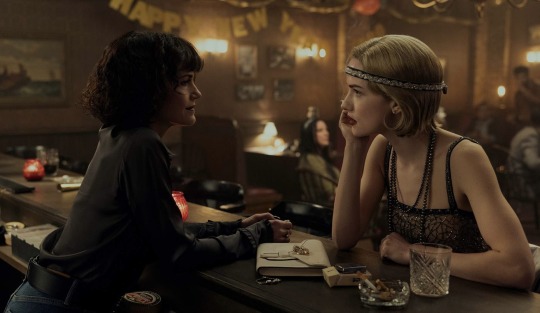
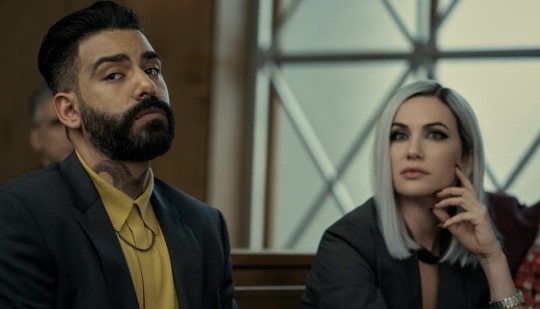
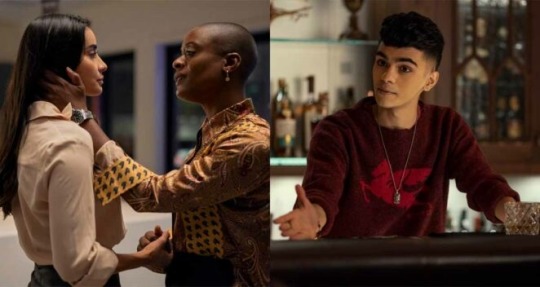
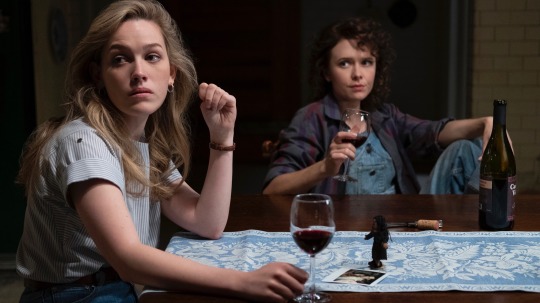
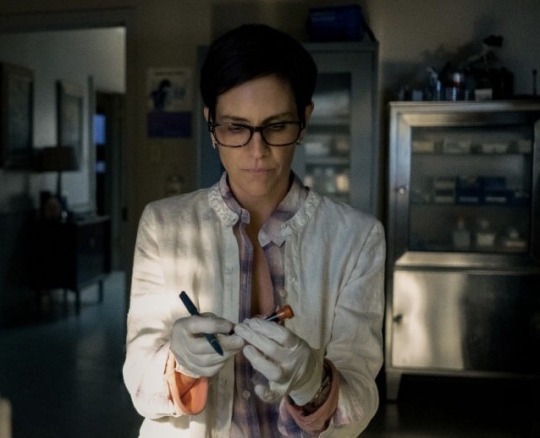
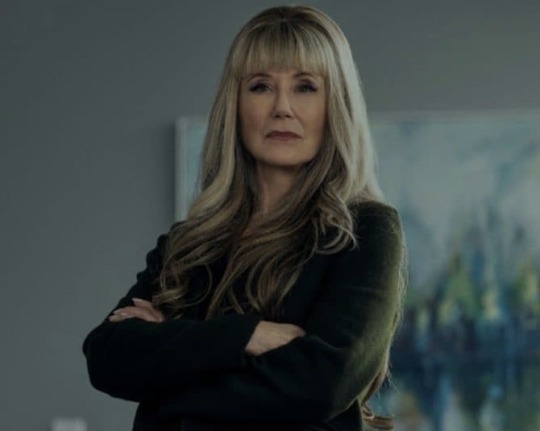
#pretty please?#not to be that person but I’m literally just another gay 😌#shout out to the trans and queer identifying folks too#carla gugino#kate siegel#rahul kohli#t’nia miller#sauriyan sapkota#victoria pedretti#amelia eve#annabeth gish#mary mcdonnell#fall of the house of usher#the fall of the house of usher#the haunting of bly manor#the haunting of hill house#midnight mass#mike flanagan#tfothou#thobm#thohh#lesbian#gay#bisexual#lgbtq
5K notes
·
View notes
Note
cannot stand when you inform or tell someone theyre spreading terf or radfem shit by saying things like "mspec/male lesbians are lesphobic" or "queer is a slur and should be censored" or "it's so tragic to be attracted to men </3" or other stuff like that, and they respond with "im not a terf tho cuz i support trans people <333 (i just think people who dont conform to my expectations of gender = sexuality should die and are a danger to lesbians a.k.a white cisgender allo perisex women) <33" as though the only thing terfs talk about is their hatred for trans people,,
people need to learn about lesbian separtism becuz those were basically proto-terfs,,and it is just really sad to see the lesbian and overall sapphic community become so blindly welcoming and accepting of this type of shit,,like even mspec women who do identify as wlw and not mspec lesbian are still treated as dirt, as "expendable" or even as that annoying younger cousin who wanted into your secret club so you take pity of them and say "sure, fine, you can join, but don't talk too much" when it comes to the sapphic community and it breaks my heart, it hurts to see this happen, and i cant help but think of the ways i could help fix it, or if its just a fire that should burn until it wears itself out and you just gotta hope it doesn't destroy too many good places,,,
kinda makes me wonder if fellow gays and queers felt this way back when lesbian separtism was a big thing and how they handled it
i love that i got this message after seeing someone get very angry at being told the "q slur" narrative benefits terfs because "queer being a slur has nothing to do with excluding trans people!!!!!" and my first thought was ".......terfs have more than just that one main belief????" refusing to accept that pretty much all exclusionism/gatekeeping either comes directly from terfs or benefits them is wild to me.
and it's always people who think they're being called a terf when it's pointed out who refuse to accept it. like.....you're not being called a terf, you're being informed that you bought into terf shit. reevaluate and move on. it's not that deep. some critical thinking instead of blocking your ears and shouting about how terfs think one single thing and nothing else would be super nice.
but yeah, it sucks. and it sucks that this is all recycled queerphobia. and it sucks that people would rather repeat queerphobia of the past than learn and accept queer history and build off of the inclusive activism and work queer folks before us did.
#asks#anonymous#terf mention#lesbian separatism#lesbian antagonism#mspec antagonism#queer antagonism#exclusionism#mspec lesbian antagonism#long post
124 notes
·
View notes
Note
What are some ways that I can appear nonbinary when I'm not out yet?
Lee says:
I think we got this an an off-anon and on-anon ask by accident?
There’s no real way to “appear nonbinary” because non-binary people can look like anything! Some are male-passing, some are female-passing, and some are androgenous, and there are AFAB and AMAB folks in each three of those categories.
I’m non-binary too, and I had originally wanted “confuse cis strangers on the street” androgyny, but it wasn’t exactly what I ended up getting as I transitioned.
I had wanted people to not gender me at all or automatically use gender neutral terms for me without me having to come out for every interaction, but instead I ended up getting gendered as male 50% of the time and gendered as female 50% of the time.
It’s really hard to pass as non-binary- I’ve found that strangers who can’t tell what gender you are sometimes refer to you with (maybe randomly chosen) gendered pronouns and gendered terms anyway because they’re stuck in a binary mindset and don’t know what else to do.
Or they become hostile, so you might find yourself getting shouted at when you enter the women’s locker room, and if you go to the men’s locker room they might tell you to leave too.
It’s therefore almost impossible to consistently pass as non-binary, whether or not you’re out, because you can’t pass as something that people aren’t even aware exists.
I didn’t really like that- while being gendered as female and male in equal parts might be as close to androgyny as I could get, I was dysphoric when people saw me as a girl. Some people’s ideal presentation is being able to switch between passing as male or female, but it just wasn’t right for me.
In the end, I came out to everyone as nonbinary when I was 15, and now I’m gendered correctly by all my friends and coworkers and classmates, and after a few years, by most of my family too.
Now I’m almost 21, and I’m on T, I’ve had top surgery and a hysterectomy, and I tend to present myself in a masculine way because I’d rather strangers gender me as male than as female.
I still identify as nonbinary and I’m out as non-binary in all areas of my life, but I feel like “choosing a side” to present on is a choice I’ve had to make myself or strangers would choose it for me, and being misgendered as female feels wrong and hurts me more than being gendered as male, which feels neutral.
I’ve accepted that being correctly gendered by those close to me is going to be the closest I get to appearing non-binary, even though in an ideal world I’d be able to have people automatically use gender neutral terms for me and pass as non-binary.
But I’m a pessimistic sort, and everyone is different, so maybe you’ll find a way to appear non-binary without coming out! I have met some people who are wonderfully androgynous, and I really don’t mean to be discouraging here when I share my personal experience.
Androgyny Tips
Mix and Match Androgynous Swimwear For People Of Any Gender
Practical Androgyny
Formal Tips for Nonbinary Cuties
Activewear for the androgyne aesthetic
What should I wear to prom?
9 Plus Size Cuties Share Tips For Androgynous Style
Androgyny for AMAB folx
If you’re AMAB, you should try some of the stuff in the Transfeminine resources! People do tend to find that it’s more androgynous to balance the feminine with masculine. So amab people trying to be androgynous might move toward the feminine side to counter any masculine secondary sex characteristics you might have and try growing out your hair, shaving your face, wearing feminine clothes, painting your nails, etc.
Tucking
Chest area
Voice
Broad shoulders tips
Hair removal
Feminine walk
Curves
Waist training
Growing out your hair
Clothing
Makeup
Passing
If you’re AFAB, try the stuff in our Transmasculine resources! That’s because if you have a feminine secondary sex characteristics in your body/voice/face, you’ll want a masculine haircut and clothing and probably binding or wearing a sports bra will help too, because people tend to look at a chest and instantly think “female” so that’s something that needs to be smushed down a lil.
Binding FAQ
Masculine clothing
Facial hair
Masculine makeup
Getting short hair / Masculine long hair
If you can’t start T
Lowering your voice
Packing and standing to pee
Passing as male
Not shaving legs
Swimming
And some people may choose low-dose hormones to get to a more neutral looking place! This isn’t something you’re likely doing right now since you haven’t gotten to the coming out part of your transition and people eventually tend to notice if you’re on hormones, but I’ll mention it anyway.
Non-binary medical transition & hormones
Example language to use in letter
5 myths about non-binary transition
Transitioning While Nonbinary
Lower surgery options: nullification or both-ification (Read third mod answer)
Can I get a penis but keep my vagina?
Non-binary voice
But again, a common misconception is gender neutral = non-binary = androgynous , but there’s no one way to be non-binary, and no particular way that non-binary people have to present.
Some non-binary people look like men, some look like women, and some look androgynous, and there’s plenty of nb folk who are somewhere in between. Being non-binary is about what you feel your gender identity is, not what your gender expression is.
The genderbread person
Separating Out Gender Identity from Gender Expression
What is gender expression?
10 myths about nonbinary people that it’s time to unlearn
What Does It Mean to Identify as Nonbinary?
Too Queer for Your Binary: Everything You Need to Know and More About Non-Binary Identities
Genderqueer/Nonbinary 101
So the whole concept of “appearing non-binary” is based on the stereotype that there’s a particular way that nb people have to look, which is invalidating to all the non-binary people who don’t look like that. But of course, trans men and women asking about looking male or looking female know the same thing- there’s no one way for men or for women to look, and saying men-only-look-like-this is a narrow and invalidating message to be giving out.
So we have to recognize that “passing” as your gender is entirely based on stereotypes, while also admitting that passing is something that affects our everyday lives and can affect our comfort, mental health, and safety, so there’s nothing wrong with wanting to pass. And that’s just a lil something I always have to say.
Followers, any tips on appearing nonbinary when you’re closeted?
#Lee says#nonbinary#androgynous#gender neutral#looking nonbinary#passing as nonbinary#genital m#penis m#vagina m#Anonymous#transgenderteensurvivalguide#trans#transgender
204 notes
·
View notes
Text
i got angry. and when i get angry, i rant. and when i rant, i need to share the rant with the void of social media, just to have an outlet.
if you don't agree with me, i don't care. not looking for discourse.
i watched this video, for context. literally no one cares but idk
https://youtu.be/5uaJ1XyRwrU
Ok this is about to be long so bear with me.
To begin with, why are we still gatekeeping? It's 2020. Queers should stick together instead of debating who's identity is "valid" or not. Let people be who they want to be.
Also, I don't know what your views on trans people are (think you've made videos with trans folk so I'm guessing you're not intentionally being transphobic), but the preferred pronoun law is actually meant to PROTECT trans people. Which is fucking needed. In 2020 alone there have been at least 36 people killed in the US for being trans. There are probably a lot more, considering murdered trans people often get misgendered by the cops and the statistics don't include them. World wide, more than 3000 trans folk have been murdered for being trans in the last 11 years. And again, there's surely a lot more we don't know about.
The preferred pronoun law that you mock is life saving. It keeps trans people from being outed where it would be dangerous to be outed. Most trans people are killed by someone they know. Yes, the law is there to provide an encitement to use trans folk's correct pronouns because it can induce extreme dysphoria to be misgendered, but more importantly, it's there so a trans person's coworker or boss is less likely to mis-gender them and out them.
And the part where you said you can get a fine for misgendering when you make an honest mistake; no, you can't. At least, that's not what the law is for. The law is for repeated misgendering, demanding license or medical proof that you are biologically the gender you identify as, etc.
As you may have already guessed by my passion for this topic, I am myself trans. Non-binary, to be precise.
Now, I know that we as humans love to label things. I love to label things. I love labeling myself! I like knowing other people's labels! When someone identifies as merely "queer", I get this itchy feeling of: "yeah, but what ARE you?"
I get wanting to label things. What I do NOT get is aggresively stating that someone's identity is invalid. Identifying as simply "queer" is fine! If that's what you resonate with, go for it! Does it irk me that I don't know what that means exactly for you? Yes. Does my inherent need to categorise people start shouting for attention? Absolutely. But it's their identity, and that's cool! It is really none of my business, as long as I know what pronouns to use.
Now, I understand the confusion and anger around this. Before I came out as or even knew I was non-binary, I identified as a lesbian. Love being a lesbian! It's great! I really identified with that term, and I still do.
But then I realised I was trans, and thought hey, I'm not a woman, can I still label myself as a lesbian? Should I just say I identify as "attracted to women"? Say I'm gynosexual and confuse everyone including myself?
I went with just calling myself a lesbian, because that is the term I've used about myself for years. When you said that this word is very important to some people, you were right. Where you were wrong, however, was when you implied that it isn't hugely important to us, too.
Because here's the thing: gender and sex are not the same thing, and more importantly, gender and what pronouns you prefer are not always directly correlated. I know this might confuse you. That's totally fine! I'm confused about everything almost all the time, I feel you! But it is how many trans people feel. I get this tingly awesome feeling when someone refers to me as he/him, because I want to be percieved as masculine. I don't feel like a man, but I want to be seen as masculine or androgynous. I use they/them pronouns, because it's easier than explaining that sometimes I want to be called him, but sometimes not, and basically explain my entire gender to someone.
I understand this feels threatening. It feels like someone is taking away your identity that means so much to you, and that you might have endured a lot of hardship for having.
But remember, us trans people have gone through shit, too. I don't mean to in any way compare the two struggles. I don't want to sit here and say "we have it worse", because really, it doesn't really matter. What matters is this: I get misgendered every day. When you're a binary trans, you can pass for being cis and automatically be called what you want. That will never happen for me. Unless someone asks me my pronouns (which is the best, try it), they are going to assume I'm a female. And I don't blame them! I see boobs, I think girl, too.
Now, imagine you have struggled with figuring out yourself for a long time, and you finally, finally find what you are. What you identify with. And then someone says that you can't identify as that, because you don't fit the mould. News flash, I never fit the mould anywhere, ever! The one place I have always felt safe and happy is within the queer community. And that's why gatekeeping fucks me up so much. Because people like me, who have been the weirdo all their life, hating their body and not knowing why, being confused and scared, not daring to come out, not wanting to draw attention to myself, finally find a place to belong. And then you get shut down. It feels awful.
Explaining that gender and pronouns don't have a direct correlation is hard. Because you can't really explain it. It's just a statement. Like: gender and sex aren't the same thing, but even harder, since it's based on experiences and not the fact that is: trans people excist.
Now, I know that this might have been focused more on cis women who use the pronouns he/him. And yes, like you said, pronouns do indeed give a big indication on what gender identity someone has. But it doesn't HAVE to. They might have a weird or bad relationship with their femininity for various reasons, or they might just feel like a woman but not identify with the female pronouns.
For example, I have a gender I know what my feels like. But I can't explain it for the life of me. Try explaining your gender in detail! It's a lot harder than you think, and it gets even harder to explain when the words aren't even invented.
A he/him lesbian is not a man trying to make fun of your identity, I promise. It's someone who either doesn't have any other word to use (like me), feels a strong connection to the word and associated identity (also me), or a woman who doesn't want to be labeled as she/her for various reasons, but who is attracted to other women. We are not here to shit on your identity! Please don't shi on ours!
I know that probably no one will read this absolute monster of a comment, and that's ok. I got so upset I actually teared up a little bit, so I felt like I had to express myself or I would be thinking about it indefinitely.
Please, if anyone's reading: be respectful. Understand that understanding others is hella difficult, but we have to try, and that both gender and sexuality is very fluid and complicated.
I tried to be as respectful as possible, please have the same courtesy if you intend to commt on my comment, so to speak.
Sad but hopeful lesbian signing off!
19 notes
·
View notes
Note
i’ve seen a lot of stuff against people who identify as queer. it personally feels like the label that fits me best.. is it wrong to feel this way when i could just say i’m bi or something?
Hi there! There certainly is a lot of talk about the word queer, and I don’t blame you for being uncertain.
Here’s my short answer: it is not wrong to feel queer, it is not wrong to use the word queer if it fits you, and whether you use it or not should be entirely your choice.
Here’s my long answer: queer is a great word! It is a word that I use for myself, though I also use more specific labels like bi, depending on what suits the situation.
Queer is really excellent because it is so inclusive and so vague. It can encompass sexuality, gender, romantic orientation, and beyond, and it doesn’t even require you to know exactly what’s going on. “Which fits better-- bi? Pan? Ace? Gay? Something I haven’t discovered yet?” You don’t have to know exactly to find shelter under the queer umbrella, and even if you do know, you don’t have to share the specifics to get the point across.
Queer also, for me: connects me to my community’s history, promotes a worldview that challenges what we consider “normal,” expresses a certain way of reading and writing, expands that inclusivity to welcome in and connect with other members of the community, and more.
Your relationship to the word can encompass all of these, or none of these, or some of these and completely different ones, but the point is, queer is a very flexible word, and that is a reason that many people like it.
Now. As you know, a lot of people don’t. This conversation has been going on for years, especially in online spaces. Here is a post I wrote about it two years ago, in 2018 when someone asked me to stop using the word.
As I touched on in that post, and as I have since continued to read about, the pushback about queer initially comes from exclusionists and TERFs (which stands for Trans-exclusionary Radical Feminist, even though there is little if anything feminist about them).
They are very into the idea of policing and gatekeeping who is or is not allowed in certain communities. Their rhetoric actively harms and invalidates trans and nonbinary people, gender non-conforming cis people, asexual folks, aromantic folks, bi/pan/multi-gender attracted folks, questioning folks, by turns.
If people are going to be excluded on the basis of identity, it helps a lot to know what their identities are. “Queer” is just too broad. And queer also means that we take people who want to be here, and we recognize that everyone’s experiences are different, and we do our best to uplift each other, which is fundamentally different than exclusion.
Now, the people you’re encountering may not actively be trying to harm folks. You, being uncertain, are not trying to harm folks. From what I gather, it’s really easy for arguments like “queer is a slur” to be passed on and shared around, especially young or newly questioning queer folks, especially for folks who are isolated in real life and only have online spaces to turn to.
And it’s confusing! “Don’t call people slurs” is arguably good advice! And I would not call someone queer who wasn’t comfortable with it. But the argument falls apart when you think about how long queer has been reclaimed, and how often “gay” or other labels have ALSO been used to attack people and yet are not being challenged in the same way, and when you see people using it to dictate how other people should and should not identify.
My tags are unfortunately not as organized as I’d like, but I’m going to point you towards my #queer, #queer discourse, and #queer stuff tags if you want to continue reading further. You’ll find examinations by other bloggers that I learned from, and you’ll also find posts about queer joy, and what it means to some people including me.
As a final note. If you choose to call yourself queer but aren’t comfortable doing so on tumblr where this discourse IS rampant (or in any other space where it seems unsafe)... you don’t have to. The word is for YOU to use and whether you shout it or whisper it or think it silently, whether you take it or decide it’s not for you after all, and the ways you use it are things that you can determine, and that you can change whenever you decide. You can take the time and the space to figure it out. And I wish you the best <3
9 notes
·
View notes
Photo
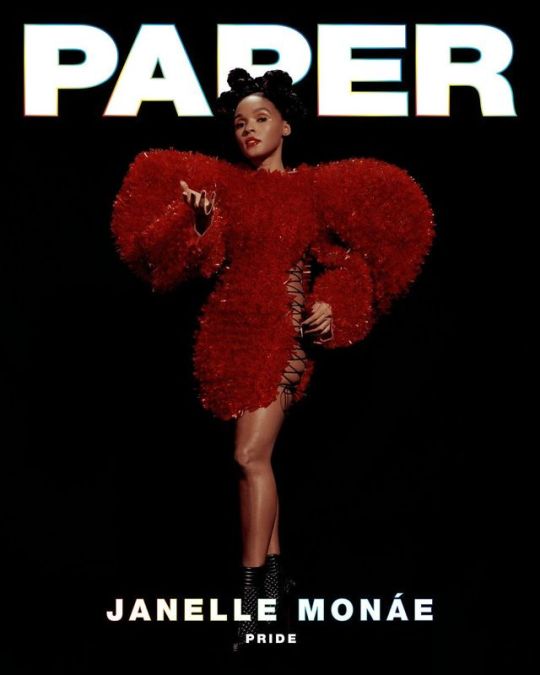
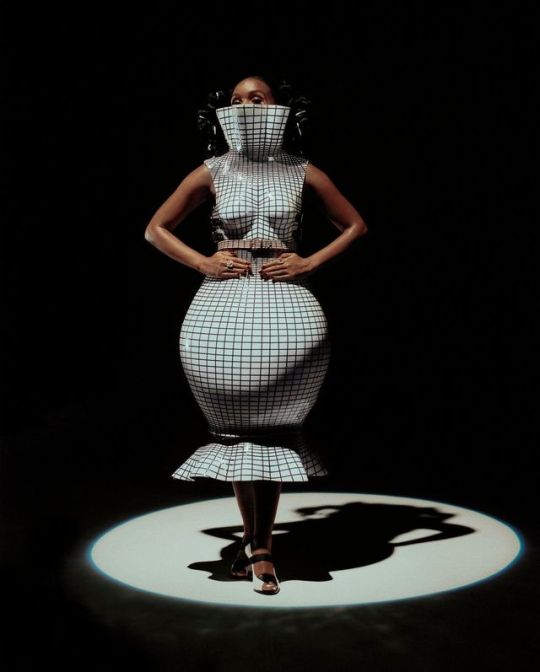
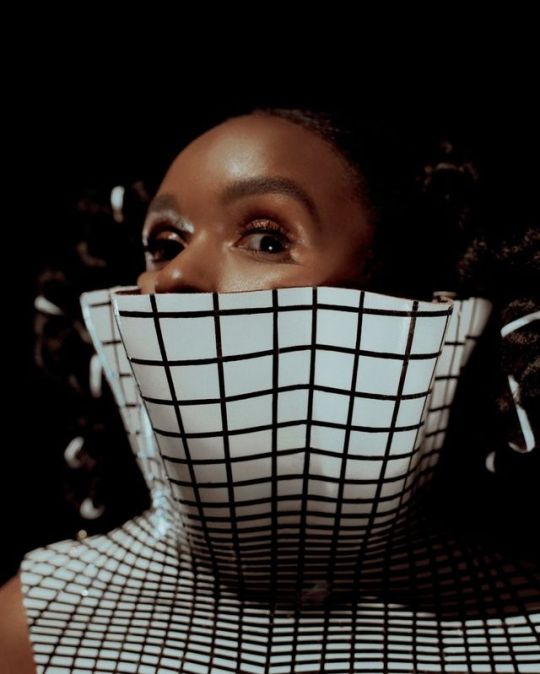
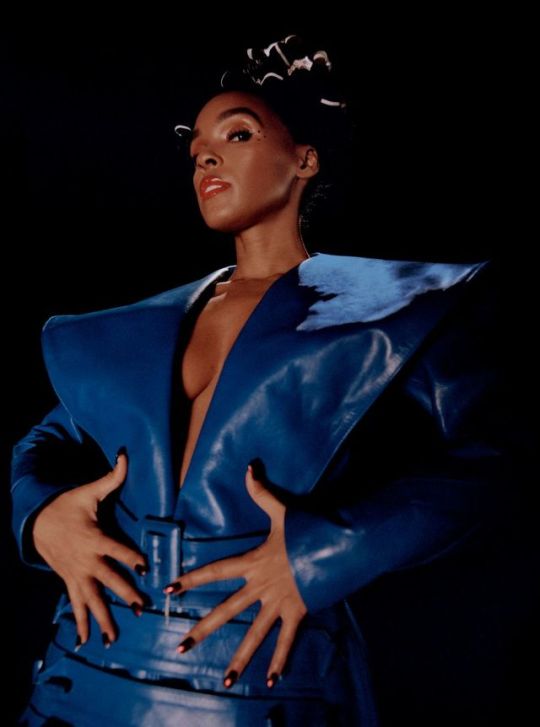
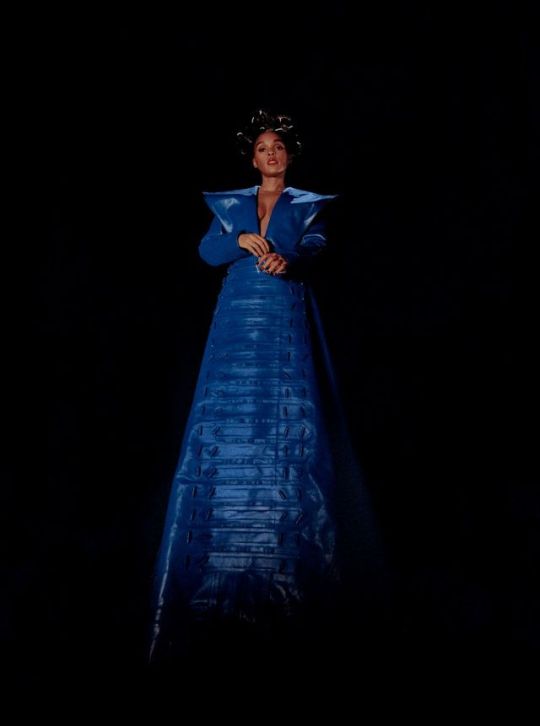
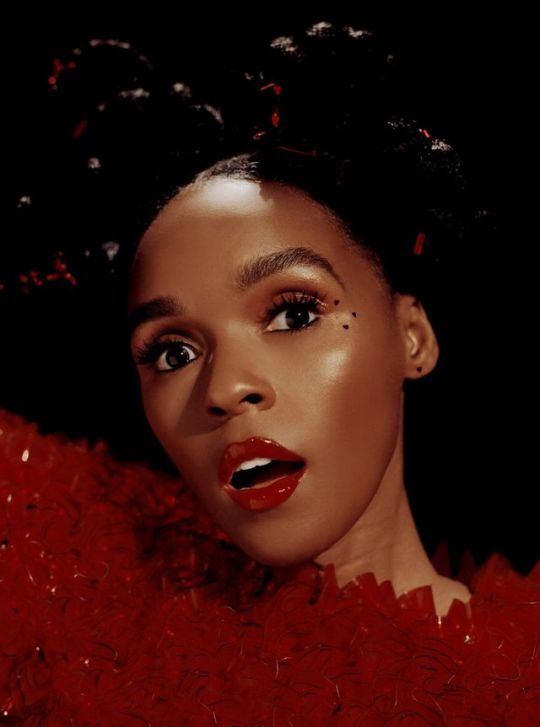
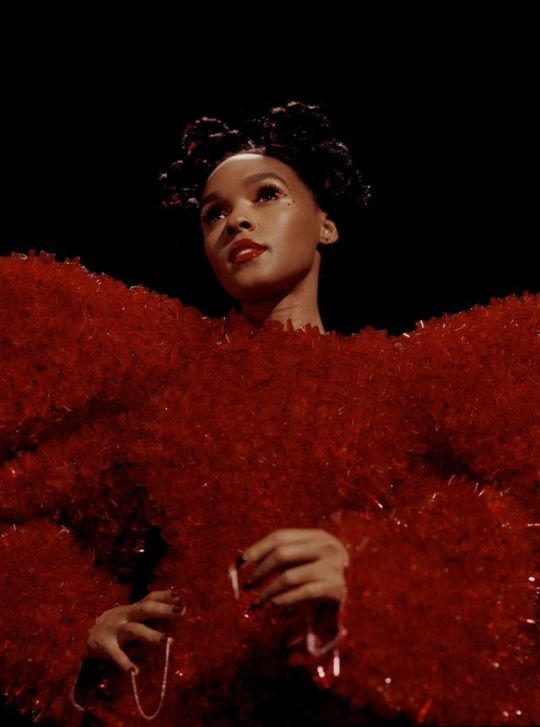
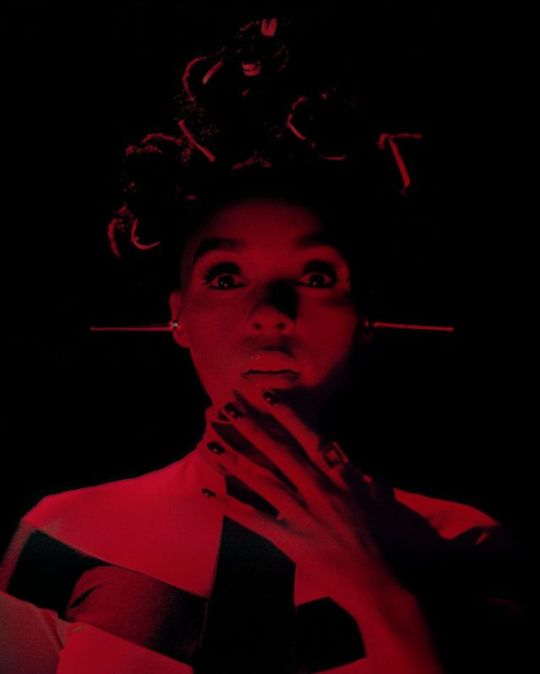
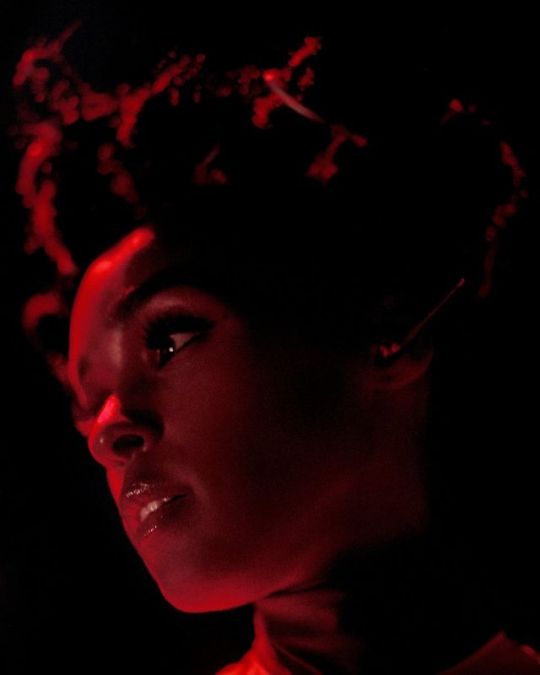
Janelle Monáe: Trans Folks to the Front
Story by Peyton Dix
Sometimes it's hard to be proud during Pride. Janelle Monáe attended her first ever Pride parade this June in New Orleans. That same day a(nother) trans woman of color by the name of Layleen Polanco was found dead in her cell at Rikers. The 27-year-old House of Xtravaganza member is one of 12 trans women killed this year on record, and underlines an increasing issue of violence against Queer and Trans People of Color (QTPOC). Although these exist separately, Pride is oftentimes a month that makes it much easier to focus on the former (parades, rainbows and glitter that gets stuck in your hair for years) instead of the latter (the fact that many queer people are still largely at risk of violence and oppression).
Over the phone, Monáe unpacks parts of her past and dives into the 2018 Grammy-nominated Dirty Computer, but her passion pops out elsewhere. She mostly leans into battling bullies ("We have to be taught how to deal with bullies and bullies need to be taught the repercussions of bullying somebody"), creating active change ("Sexual identity needs to be taught in school. There should be courses on mental health, how to coexist, how we can all learn from each other"), and the importance of empowering and standing up for QTPOC ("In the same way we want white folks to support us and be better allies and use their privilege to make change in those power dynamics, it's up to us to protect those who may not be as privileged").
Throughout the conversation, Monáe is steady in the way she speaks, but her tone shifts and her pace increases when reaching these topics. The performer's anger and sadness are palpable and warranted. "I look to Indya Moore, Mj Rodriquez, Janet Mock (my Pose family)... Laverne Cox, those women are putting themselves and their lives on the frontline everyday. When their trans sisters and brothers get murdered, they feel it. We have to support them... It's just a responsibility I feel. I could do better. I'll do better."
This isn't the first time Monáe, someone at the epicenter of pop culture, has recentered the narrative to focus more on one of the most othered groups in the LGBTQ community instead of herself. Although Monáe can only attest to her own experiences, she has actively made sure to advocate, and make space, for her entire LGBTQIA community. Her performance of Dirty Computer's "Americans" on The Late Show with Stephen Colbert opens on Pose star Mj Rodriquez, who's trans, before the camera slowly pulls out to reveal a group of POC femmes holding each other. She sings a song that says:
Until women can get equal pay for equal work
This is not my America
Until same gender loving people can be who they are
This is not my America
Until black people can come home from a police stop
Without being shot in the head
This is not my America
Monáe publicly dedicated her two Grammy nominations to her "trans brothers and sisters," who she says "are shunned from these sorts of events." Institutional award shows, including the Grammys, are inherently and historically spaces of white, cis, male privilege. While they have recently gotten Blacker, our understanding of diversity must always continue to grow more intersectional. This is part of what Monáe is working toward herself, and advocating for from her audience.
Dirty Computer itself was an honoring of the 'other,' full of anthems for the ostracized. The genesis of the project was birthed from her understanding of Monáe's own self. Her "walking in truth" got her two Grammy nods, a GLAAD Media Award for Outstanding Music Artist, and was named one of the Albums of the Year by The New York Times, Complex, TIME, and Rolling Stone, among others.
But it isn't these accolades that make Monáe proud. In fact, it was her choice to do something scary, to take a risk and tell the truth, and thankfully that resonated. "I'm just happy that my personal story has also been personal stories for so many other people. There's so many young people who grew up in the South or Baptist families, who were told that they won't be accepted by Christ. They can listen to this album and feel hugged. They can feel loved. They can feel seen. They can feel heard. That's the most beautiful thing." Monáe's fans were not just able to find parallels with her journey, but able to find validation in being "dirty." With this album she extended an open hand.
"Folks who are not comfortable speaking out about your sexuality publicly, we see you and you are valid and you matter."
Right before dropping Dirty Computer Monáe came out as pansexual in Rolling Stone, calling herself a "free ass motherf*cker." She reinforced that notion with songs like "Make Me Feel," "Crazy, Classic, Life," and "Django Jane." She solidified it every time she championed free gender expression with her clothing, and drove home the point when her boob winked at us this past Met Gala. Monáe is so exceptionally herself, so sacred in her skin, which shines not only through her music but in her powerful roles in 2016 films Moonlight and Hidden Figures Her character in Moonlight, Teresa, a pseudo-guardian to the young, Black, gay protagonist Chiron, sees many parallels with Monáe herself. She is strong, proud, protective, nurturing and poised. But that wasn't always the case.
Monáe grew up in Kansas City in a Baptist church, with a Christian family and in shoes very different from the ones she walks in now. She remembers being quite young when she realized she was queer, and although the vocabulary wasn't there, the feelings were. "I was like eight," she remembers. "I don't think I actually knew how I identified. I knew that I was attracted to women, girls, men, boys. I knew that." Like many LGBTQIA+ people raised in more rural and religious areas, Monáe found it difficult to ask those questions without feeling ostracized.
"I've seen people get beat up because they were considered to be 'too feminine' or 'too masculine' for how they identified," she says. Some of those people were family friends, including a gay male friend of her aunt's, whom she watched be shunned from his community. "It was because of Black men who thought he was trying to come onto them, but he wasn't," Monáe says, "It was their own ignorance and insecurity and fear that led them to lash out. When I saw that..." her voice trails off. "To be a gay Black man, and Black men are like the 'heads of the households' and I'm a Black woman, this young kid. I thought, then it's really over for me."
Imagining that side of Monáe's experience is difficult now that she's cultivated such a strong and specific voice around queer politics and gender identity. It's hard to imagine that side of her experience having seen her on her Dirty Computer tour last year, and having been part of the sea of voices in Madison Square Garden shouting "I'm dirty, I'm proud" back at her. Pride has become such a staple in her narrative and her art.
But this month it's all too easy to feel forced into living your most out and proud life, when for many that's actually much easier said than done. "We have to make sure that we don't pressure people to come out," Monáe says. "Everybody doesn't have the same set of circumstances. There are people, young people in particular, that will be cut off from their family, hanged or jailed if they walked in their truth. Folks who are not comfortable speaking out about your sexuality publicly, we see you and you are valid and you matter. We have to protect our babies, especially in the LGBTQIA+ community. We have to do better. "
Photographer: Kelia Anne
1st Assistant: Carlos Quinteros Jr.
Gaffer: Brandon Waddell
Hair: Nikki Nelms
Makeup: Jessica Smalls
Stylist: Alexandra Mandelkorn
Nails: Kim Truong & Diem Truong (using KISS Nails at Star Touch Agency)
Location: Smashbox Studios
http://www.papermag.com/janelle-monae-pride-2638969039.html
341 notes
·
View notes
Text
10 Characters 10 Fandoms!!
Rules: Name 10 characters from 10 different fandom’s that you like, then tag 10 people.
thanks to myGem @thescarletgarden1990 for tagging me, ive been trying to cut down on screen time during quarantine... these shows and characters that are too good to resist!!
Daenerys Stormborn ASOIAF
Book/Series available on HBO

🔥KHALEESI OF THE GREAT GRASS SEA🔥 THE UNBURNT🔥 THE BREAKER OF CHAINS🔥 🔥🔥🔥THE MOTHER OF DRAGONS🔥🔥🔥 i love dany so very much!! at this point i don’t really care about the books and the show can fuck right off 🔥SHE IS MY QUEEN NOW AND ALWAYS🔥
Sestras Orphan Black
Series available on BBCAmerica/Amazon Prime

My sestra Sarah, stepped off a train one day and met her self...ugh my heart🥺 Just one. I’m a few. no family too. Who am I? an amazing sci-fi thriller series that’s who!! Welcome to Clone Club, this is honestly the best thing I’ve ever seen, please do yourself a favor and go watch this!! Tatiana Maslany is insanely talented and so underrated!!periodt!!
Cluster Sense8
Series available on Netflix
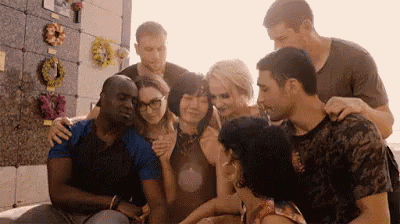
Amor Vincit Omnia, Love Conquers All✨💗 in my heart of hearts i like to think that i’m a unborn homosensorium-just like Amanita✨💗 this is honestly so beautiful and powerful, it’s taught me so much and made me grow as a person! honestly this is so much more than just a show and that’s why netflix cancelled it!!
House of Evangelista Pose
Series available on FX/Netflix

10 10 10 10 10s ACROSS THE BOARD!! YAS QUEEN!! set in the 1980s NY ballroom scene we follow the stories of queer folk and trans women of color and the houses they form!! as a Queer Latina let me just say this is SSSssoOOooo IMPORTANT and i’m very happy these stories/characters/lives are being represented in mainstream media🦄🦋👯
HellBoy
Graphic Novel/Movie(s)
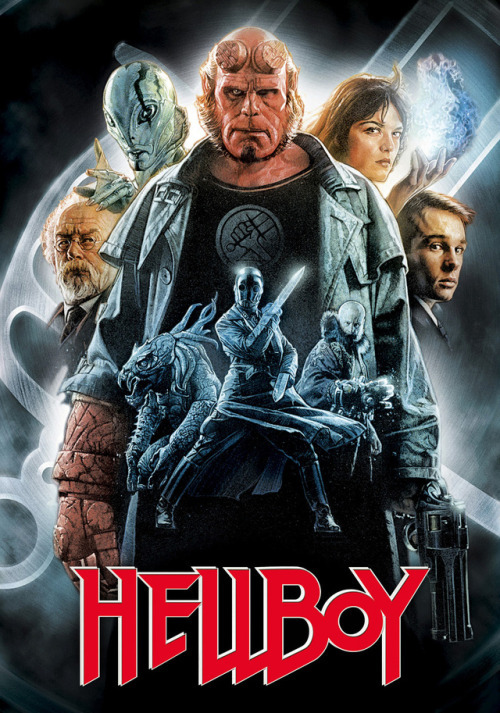
Existential crisis at its best!! Though the comics, Guillermo del Toros films, and the newest film adaptation are all different and have their own twist-i think it’s safe to say that us monster fuckers agree we love Hellboy and are grateful for any and all content!! go watch “The Golden Army” it’s in my top 5 favorite movies and it dives deeper into Hellboys inner conflict and the lore/mythos of that universe.
Vanessa Ives Penny Dreadful
Series available on Showtime/Netflix

A goddess reborn hunted by darkness. this is what i’m here for lol believe me when i say my brother and i can go word for word in the séance scene😈 that being said i am super bitter about the ending WE WERE SUPPOSED TO GO TO EGYPT!! i love all the women in this show, season2 is the best, my heart breaks for vanessa... she’s so fucking strong!!
Prudence Blackwood CAOS
Series available on Netflix
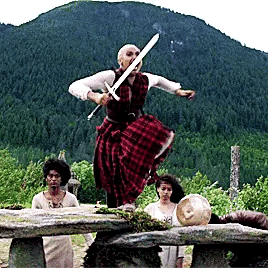
i watch this series for Prudence, Ambrose and the weird sisters!! That being said Prudence is the whole package and everything i want to be!! she has it all, the costumes, perfect hair and make up, sex appeal, knowledge in spellcasting, and she’s gonna kill her father!! Hail Lilith this succubitch is so aesthetically pleasing and a total badass!! fun fact Tati Gabrielle chose to do a “voice” for Prudence that’s inspired by Eartha Kitt! respect! how awesome is that😻
June Osborne Handmaids Tale
Book/Series available on Hulu
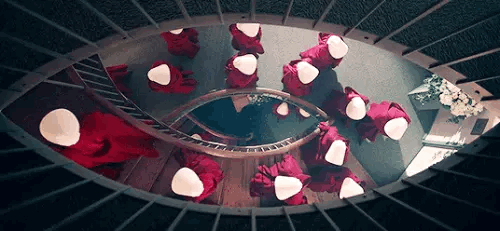
Illegitimi non carborundum! Don’t let the bastards grind you down! if this isnt the biggest wake up call for  women’s reproductive health in the States then idk what is🤬 honestly this show can be a little scary because of how real it appears to be and it goes a lot further than the book did. Ive made my sisters, cousins and friends who identify as female watch this as well as recommend it to everyone and attend as many meeting as i can (ATX has a grassroots handmaid charter that’s protest in costume at the Capital and invites others to participate as well as spread awareness in women’s reproductive health) because i consider it to be a warning to what can be-yes it is an extreme but look at alabama, our gun control laws, state militias and the fact that VP Pence participated in a pro life rally!
Teresa Mendoza Queen of the South
Series available on USA/Netflix

🗣Teresita!! literally my reaction for every episode. This Queen has done it all! orphaned as a child after parents were guned down by the cartel, turn cash exchanger on the streets of Sinaloa, to gf of a drug smuggler -then bf dies because he was stealing money from the Cartel, Now on the run and seeking refuge from Cartels boss’s wife who has her own cartel and lives in Texas, only to becomes a slave/drug mule so she doesn’t go back to mexico, then works for the Cartel in Texas, only to find out her bf wasn’t killed but is a rat for the DEA... and that’s only the 1st season🤯 lol love this show based on la novela La Reina de Sur available also on Netflix!
Clancy Gillroy The Midnight Gospel
Series available on Netflix

The Quarantine Favorite!! Released on 420💚It’s a trippy animated podcast basically and it’s a lot to take in!! There’s over stem in visual, heavy topics, and some relatability though not for everyone -i cried a lot, just about every episode but i really liked it! also shout out to Jake the dog and Finn the human!!
tagging: whoever wants to play!! i hope everyone is safe and healthy!!
8 notes
·
View notes
Text
Rai tries to explain the furry fandom for non-furries for the 24963569356586th time because I have no life~
I’m sure I’m preaching to the choir posting this here, I just still often see people in the general internet being confused about or flat out wrong about what furries are and why we like the things we like. So here I go again, taking my frustrations out by making a long-winded tumblr post about it. But hey, if you’re confused by furries or know someone who is, maybe this will help idfk
Just be warned I am an ADHD motherfucker and there will be about 10x more words than necessary.
To start, What Are Furries?
Furries are simply self-identified fans of anthropomorphic animal characters.That is, a character that is an animal, but with many human characteristics. This can include speaking human language, human-like facial expressions, walking upright in a human-like way, wearing clothes, etc. Examples of anthropomorphic (or anthro for short) characters include Bugs Bunny, Mickey Mouse, Sonic the Hedgehog, Disney’s animated Robin Hood, Zootopia, and Beastars. All things in which the “animal” characters behave and express themselves like humans. Even movies like The Lion King and Balto have what would be considered “antho” characters, due to their capacity for human thought, speech, and facial expressions, though they would be in a subcategory often referred to as “feral” or sometimes “non-morphic” in which the character still moves and behaves largely like an animal.
So to reiterate, a furry is simply a self-proclaimed fan of anthro animal characters.
Why Anthro Animals?
I mean the obvious answer is, because it’s fun. It can be really fun and get one’s creative juices flowing trying to figure out how to blend human and animal characteristics. It’s an animal that moves and acts like a human. In what ways is it like a person, and what ways is it still an animal? Popular media like Zootopia and Beastars address that question as major plot points and worldbuilding elements. But it can also be fun to think about just when creating your own characters. And aside from just figuring out how to blend characteristics, the animal aspects of a character can offer more options of expression. Ears can perk up, droop, or fold back, tails can wag, lash, or tuck between legs, growling, hissing, etc. People often use expressions comparing human behavior and emotions to animals. You ever find yourself so happy or exited you think “If I was a dog my tail would be wagging!”
And aside from being an interesting concept to think about, sometimes it’s just aesthetically pleasing.
What is a “fursona”?
Fursona is short for “furry persona”. A BIG BIG part of the fandom is original characters. If you look at a furry art website you might see some art of Judy Hops, Legoshi, Sonic, etc. But mostly you’ll see original characters. They tend to be the main focus of the fandom. Because all the things mentioned above are fun to play with, and the fandom is big on creativity and self-expression. And what good is self-expression if you don’t use it to express... yourself?
A fursona is an anthro animal representation of oneself. Basically “Me, but an [animal].” These can be an accurate representation of oneself (example: someone who is short and meek and skittish might make a mouse fursona) or a more idealized version of who you want to be (example: same short meek skittish person might instead make a lion fursona because they wish they could be more confident, strong, and outgoing). Some people even make multiple fursonas to represent different aspects of themselves (Think Thomas Sanders’ “Sanders Sides” but with fur).
In the fandom, your fursona is also often how you represent yourself to others. In real life there are aspects of your appearance you can’t control, or that can be very hard to control. Your height, weight, bone structure, etc. But online as a furry, you can look like anything you want. This is also a very attractive concept to trans folk and queer people in general, which may explain why there’s such a high percentage of queer furries compared to the general population.
What is a Fursuit and Why do People Wear Them?
A fursuit is simply a costume made to look like a furry character. it is pretty much no different from cosplaying comic, anime, or video game characters, except that most of the time fursuits are of original characters instead of pre-existing ones. People wear them for fun and self-expression, just like any other costume.
They differ from mascot suits in that they tend to be of higher quality, and more form-fitting and expressive. Fake furries are usually pretty easy to spot on TV because they usually end up in cheap Easter bunny costumes.
While “fursuiters” are often the “face” of the fandom to outsiders, most furries don’t actually own a fursuit. They are expensive, cumbersome, take work to maintain, and don’t always play nice with certain health conditions and phobias. I personally am apprehensive about getting one because I worry I’ll have difficulty breathing, and I easily overheat. Others simply don’t see the appeal of dressing up.
Do Furries Think They Are Animals?
Generally speaking: No. People often mix up furries with a subset of otherkin known as Therians. Otherkin are people who believe themselves to be in some way non-human, usually spiritually or mentally a non-human creature. Therians in particular believe themselves to be in some way a non-human animal.
Furries are on the other hand, as I said, just fans of anthro characters. While there are likely furries who are also therians, most are not.
People who approach furry conventions to yell “You know you’re not really an animal!” at the fursuiters is about the equivalent of going to an anime convention and shouting “You know you’re not really Naruto!” at the cosplayers.
Is Being a Furry a Big Part of a Person’s Life?
It varies, just like any other fandom. Take anime for example. Some people just watch it and maybe talk to their friends about it and that’s it. Others might go online to view fanart and read fanfic, even go to conventions. And some people fill every aspect of their life that they can with it, filling their home with merch, getting tattoos, even building careers like being a youtuber around it.
The same goes for furries. For some people it never goes beyond consuming media and art, while for others it plays a big part in their day to day life.
Is it a Sex Thing? (VERY ADULT AND SENSITIVE CONTENT BELOW THIS POINT)
I won’t beat around the bush here. There IS a sexual side to the fandom, just like any other fandom. Any anime, comic, video game, TV show, book, there is a sexual side to its fandom. Furries are no different. Just like it’s easy to find anime porn, it’s easy to find furry porn. People be making porn, idk what to tell you.
“Isn’t that zoophilia?”
Some people seem to feel that way about it, but no, not really. The thing that differentiates furry porn from watching two dogs hump at the park is that the characters are anthro. They think and express themselves like people, and fans relate to them as they would with human characters.
This

is in no way the same as this
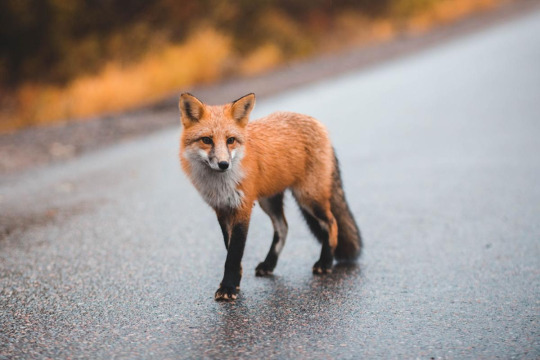
“Do people have sex in fursuits?”
Generally, no, for various reasons.
1. They are expensive and take work to maintain and keep clean, and you don’t want to get various fluids on them.
2. They can be cumbersome and get really hot and stuffy, not ideal.
3. They just aren’t made for it. They don’t usually offer access to ones’ genitals, and thus having sex in them would be rather difficult.
There ARE some people who will get suits specially made for having sex in, with holes in all the necessary places, but you’re not likely to see those out in public. Generally if you see someone walking around in public in a fursuit, you can rest assured it’s probably not been used for sex.
“Ugh but that’s weird!”
I mean, people dress up and roleplay characters during sex all the time. Is dressing up as Krystal the Fox all that different from dressing up as Harley Quinn? And anyway, what does it matter to you what consenting adults get up to in the privacy of their own bedroom? Maybe don’t think too hard about other peoples’ sex lives.
And despite the availability of furry porn, it is not all there is to the fandom, and not everyone participates in that part of it. Heck, there are a lot of minors in the fandom, I was a tween when I was introduced to it, and the only times I was exposed to porn was when haters would “raid” our forums and spam it at us while calling US perverts, all the while being told “Hey, there are kids here!” But no we’re totally the sex-crazed perverts here right?
“I’ve Heard About Furries Who Are Bad People”
Yeah, you probably have. It’s a big fandom and inevitably some of the people in it will do bad things. Again, it’s the same for every fandom. You take any percentage of the human population, you’re going to get a few bad ones. Actual zoophiles, pedophiles, rapists, abusers. If they exist in the general population they’re going to exist in the fandom. But generally when their actions are brought to light they are driven out of our spaces, as with most fandom spaces. No group is perfect and without its bad eggs, but most of us work to keep our spaces safe.
In the end, people looking at a group from the outside tend to only see the loudest, weirdest, most outrageous members, and assume that’s what the whole group is.
4 notes
·
View notes
Text
An NB reading of Grace in Terminator: Dark Fate
Disclaimer:
Before I start, just want to get this out here: I’m in no way insisting that Grace *has* to be non-binary, that we’re *supposed* to read her as non-binary, or that that’s in any way what she’s “meant to be”. This is just some stuff I’ve noticed that, as someone who sits on the genderqueer/non-binary/transmasc side of things, really resonated with me. Again--read her as entirely woman-identified if that’s what you want to do or feels right to you. I am ecstatic that lesbians and wlw-identified folks have someone that they feel represented in, too. I wish I’d had more characters like her when I was growing up and felt so out of place because of my gender non-conformity.
But I, for one, would love a non-binary or even trans reading of Grace.
So what I’d like to do instead is just lay out a couple ways someone who is NB-identified *might* connect with Grace as a nonbinary character.
Starting with the obvious.
Androgyny
Now, I do want to be clear that I know that gender presentation =\= gender identity. And again, obviously, people will latch onto things that they relate to in characters, and I really do believe that there’s no “one right way” to read a character. The character of Grace isn’t a real person; she’s part of a story, told by people, who had something specific to say, and her character reflects that. But from the perspective of the people who watch her, who internalize and connect with her character, there can be points of connection that have nothing to do with the author’s/creator’s intent, and so, Grace-the-character can be many things to many people.
The only real way to know how a person IDs is to ask them. That’s it, that’s all. You can’t assume. But also, sometimes, people do “ping” a certain way. They give off a sort of “energy”, and for me, Grace’s energy isn’t the sort of “diaphanous femininity” that even visibly-gender-nonconforming AFAB characters are often framed to exude.
Grace’s energy isn’t masculine, either. Her mannerisms don’t seem intended to read that way; rather, they seem intended to read as soldier.
I’m not very skilled at breaking down movements, especially when it comes to how actors move and what it all means. It’s totally possible that a lot of what’s unique about how Grace moves is because Mackenzie Davis is, self-admittedly, not the most athletically-inclined person. Grace is long-limbed and rangy and sometimes very stiff/poised, but never stiff through the hips like a Straight Dude(TM), or heavy through the shoulders like a musclebound meathead. She takes up space, too; she’s taller than Dani and Sarah both, and the only recurring characters who are “bigger” than her throughout most of the film are Carl and the Rev-9.
To be clear: Women can be tall, and rangy, and androgynous, and take up space, and that doesn’t make them less women--unless they don’t identify that way. My point with all of the above is just observing that Grace doesn’t move like a “male action hero”—but she also doesn’t seem over-the-top feminine in the way that mainstream-y media will “compensate” for perceived unfemininity, and that’s kind of wonderful. Her stature, her physique, all of that, seem to be chosen and calibrated towards an end goal that isn’t gendered: Combat, efficacy as a warrior. Whether you want to read her as a woman or as nonbinary is largely going to be about your personal preference.
This also has the effect of giving the impression that Grace is absolutely unselfconscious about her body and how it looks—and she has no reason to be, not because she looks good or bad, but because what she can do with her body is just so vastly more important, and because she’s so willing to put her body and everything it can do on the line in order to fulfill her mission (and protect Dani). If Grace has a gender, it’d be “Protector” or “Warrior”.
And in a way, what makes Grace so appealing to female-identified lesbians is the same thing that makes her appealing to NB people—Her character was explicitly designed not to cater to “the male gaze”, and therefore, she also exists outside the typical gendered confines reserved for “female characters” in media. The emphasis is just slightly different: Instead of a different way of being female, NB!Grace has little to no use for those categories at all. Again, it’s all in how you want to read her.
Grace comes from a future where survival and fighting take first priority, and you could project the same tired “Gender isn’t a ~problem~ in the future/after the world ends” approach that a lot of cis and hetero men take to sci-fi--but also, why? It’s tired. Give me a Grace who is preoccupied with survival, yes, who maybe doesn’t have time to think too much about this gender shit--but also, a Grace who finds that this “androgyny” (although she might not call it that) suits her, who takes to this way of moving and being in the world, this way of using her body, and identifies more with that than with being a “man” or a “woman”.
(Sidenote: as someone who took a fair amount of Queer Studies classes, it does irk me a bit that discussions of mainstream-y speculative media seem permanently suspended between this sort of “genderblind” futurism where “identities” just don’t exist because they’re apparently not needed anymore, or copy-pasting our contemporary discourses about identity into a future that is materially very different than ours. The point of these identities is, in part, to describe our experiences, the good as well as the bad, and those experiences of gender and sexuality don’t exist in a vacuum. So, the words we use will necessarily change to accommodate that—especially in the post-apocalypse. BUT, everything that comes after us will also bear the stamp of what came before it; it’s just a matter of what the creator means to emphasize.)
Augments & Body Mods
This is a little dicey, because there’s some clear tension in the movie between the idea of robots = inhuman/unfeeling = bad, and humans = good/feeling. And in that light, it’s potentially problematic to (even incidentally) imply that nonbinary/gender-nonconforming = not human.
But I’d like to point out that the film does deliberately challenge any neat separation of “human” and “machine” with Carl’s evolution as a person.
And based on what I’ve read from James Cameron and Tim Miller interviews, there is some “blurring” intended between human and machine in the franchise.
In fact, Carl and Grace are foils for each other, somewhat, in the sense that they’re on opposite ends of a spectrum where human and machine become blurred, and I love that. As a genderqueer person with a very fluid experience, it appeals to me on a deep level because you could spend literally forever breaking down where does one “gender” end and another begin--emotionally, socially, spiritually, and physically.
So the fact that there’s (1) no hard binary between human and machine (it’s explicitly subverted), and (2) we’re given multiple points of inflection, especially if you count Sarah and the Rev-9--alleviates a lot of the tension I’d feel otherwise in mentioning this. But I don’t think this is something that should be allegorical or a direct comparison; I think that it operates best on a metaphorical or theoretical level.
And just, it’s the whole vaguely-cyberpunk idea of modifying your own body, not in a mass-produced or manufactured sense, but in this organic and highly individual sense, born out of contingency and necessity, that makes Grace’s Augments so meaningful. It’s one of the things that makes her read as human, too, because it feels more in line with our tendency to stick ink, steel, bone, what have you, through our skins whenever we get the chance--as opposed to some kind of symbolic dehumanization by “becoming a machine”.
Grace routinely refuses to categorize herself in anything other than the most general terms, or explain the details of her Augments, and she seems very protective of them. Rather than seeming ashamed, this refusal reads a lot like the popular queer identity explanation “not gay as in happy, but queer as in “fuck you’”. Her Augments are part of her, and part of her humanity; she volunteered for them, she owns them, and is even protective of them, viewing CBP’s invasive examination of her Augments as a kind of violation of her bodily autonomy. They’re clearly complicated for her, but they’re anything but depersonalized.
And going even further, the reason why she volunteered for them is so that she can defend humanity--and also someone she loves (Dani). They’re an extension of her sense of family, loyalty, love, and willingness to sacrifice.
And I don’t know for sure, but I imagine that Grace is basically one-of-a-kind, even among other Augments, if only because those Augmentations seem to be performed with the tech that’s on hand--salvaged Legion tech, by the sound of it, at least to start with. So the outcome depends on the parts available, the complexity and maturity of the Augmentation technology and process, and the skill & experience of the surgeons, all of which would vary over time.
And honestly? If that doesn’t qualify as “beyond the binary”, I don’t know what does.
Some other general observations:
- Grace’s short hair is a constant throughout the post-Judgement Day scenes. As someone who started wearing their hair short as a preteen and hasn’t had hair to my shoulders since age 12, that does seem significant.
- Grace only introduces herself by name after Diego shouts “HEY LADY” in the factory before dropping an engine block on the Rev-9. Granted, most women don’t like to be addressed as “HEY LADY”, either, but it stood out to me, especially because she refused to give her name only a couple of minutes before that. Either way you read it, the line feels like it expresses some level of discomfort with or objection to that gendered statement. Maybe she finds that particular reference annoying or even offensive, but also, maybe she doesn’t really identify as a woman. She’s just... Grace.
- there were multiple times I mistook the back of her tank top for the back of a binder, even though she clearly was not binding.
- she constantly steals mens’ clothes--partly because she’s too tall for a lot of womens’ clothes around her, partly out of utility (like at the factory and CBP, where a lot of the guards are men). But also, it pleases the genderfucking queer in me quite a bit. And, I should note, when she had the option to take a female guard’s clothes at the CBP facility... she didn’t.
But ultimately, when I look at Grace, I see someone whose gender is “Warrior” or “Soldier”. And it’s so wonderful to see that so purely represented on a character we’re meant to perceive as female. So, please believe me when I say I don’t want to “take away” what Grace means for other people.
And, for the record, I do mostly default to using she/her pronouns for Grace, because that’s how she’s canonically referred to.
But just for fun--try this on for size: Using “they/them” pronouns for Grace. They (Grace) came back in time to protect Dani. It rolls off the tongue, right? It feels nice. Let’s re-try a couple of sentences from above:
- “multiple times I mistook the back of their tank top for the back of a binder, even though they clearly weren’t binding”
- “Grace’s Augments are about their ability to be a soldier. They were Augmented in order to hunt Terminators... Everything else is secondary to that, and their mission to protect Dani”
- “Grace only introduces themself by name after Diego shouts “HEY LADY” in the factory before dropping an engine block on the Rev-9 ... Maybe they find that particular reference annoying or even offensive, but also, maybe they don’t really identify as a woman. They’re just... Grace.”
And finally:
Can you imagine the poor sod who tried to make fun of Grace for having a “girly” name? lmao rip
9 notes
·
View notes
Text
Lotta trans discussions on my campus lately. Thoughts to follow on the authoritarianism of the Left with regards to trans ideology after the cut.
Undergrads came aboard to our law building and basically were shouting down this poor conservative guy who was just being honest about biology. They were sitting on the desks, the whole nine yards. The guy himself was well-informed and rational. He even mentioned the radical feminist discussion on trans ideology in a neutral manner [which is good, since I’m sure we disagree on a lot]. He mentioned the fear that women may have of men if they’ve survived severe sexual assault and abuse [a supposedly progressive dude, unsurprisingly, snorted at that notion]. You know things are bad when a self-purported alt-right guy gets to be the voice of reason, while women are censored as TERFs and banned outright from campuses for saying the same thing. Anyway, these kids were interrupting and shouting the poor author down. It got so bad that I had to, at one point, just shout: “Will you please let him talk?” At hearing one of their own, they seemed to calm down a little bit. [The student group that organized the event repeatedly asked for civility and for questions to occur at the end of the talk.]
I had to leave the talk early, so I missed the Q&A. But, after that event, the queer student group [I know, bug them, not me] had a talk with trans-identified males on the panel. One could pass out of the four total. There was one trans-identified female [which should tell you SOMETHING about who gets screen time and when in that movement].
Anyway, I thought: Cool, I’ll go to this panel too, be “balanced.” The undergrads weren’t sitting on the tables here, nor shouting anyone down. Nor could you ask any really critical questions of the movement, though. I wanted to ask why they were conflating sex and gender. I wanted to ask what it meant to be a woman when anyone who identifies as one is one. I especially wanted to talk to the passing trans-woman and get her take on the locker room discussion. But, that would be transphobic.
It is also transphobic to use the wrong pronouns or disagree with this ideology in a vocal manner, and the trans-identified female said that the university she worked at was trying to stop speech like that on their campuses. I had to snort a little when she was all, “I don’t see how that’s [dissenting viewpoints] NOT hate speech.” Hate speech... is very strictly and narrowly confined in US First Amendment law. Perhaps earlier in the term [before I got far in that course], I would’ve agreed with her. These days, though... I gotta say, the right is right [heh, puns] on this one. It is a slippery slope. You can endorse certain views, and private schools have more leverage than public ones, but the reality is that criticism of a movement is not hate speech.
I mean, I’ve also attended some reproductive rights talks these past few weeks. The female attorneys always talk about women’s liberties, usually, but the “queer theorists” are so keen on erasing women that it hurts. “Pregnant people,” “pregnant folks,” and “pregnant men” keep cropping up. I just can’t believe people think that sex is something you can change by identifying out of it. I don’t care about your GENDER identity. If your gender is a unicorn, go for it [I think that’s nonsense, but go for it], just don’t expect people to tell you that sexually you are a unicorn and conform with your internal sense of self. That’s not how the real world works. It used to be trans folks had no issue with differing between sex and gender [biology versus social identity]. Sad to see how fast that’s changed in the span of a few, short years.
1 note
·
View note
Text
Trans jealousy
So I wanted to make a post about this because it's not talked about a lot but it's definitely a very real emotion. Trans jealousy, my dudes!
I'll admit it: I'm real fucking bitter at people who started t or came out before the age 18. ESPECIALLY those with families who accepted them and supported them. Why? Because I'm jealous as fuck and it doesn't seem fair that I no longer have a family (my gender is only a part of that) meanwhile there are kids out there who could live their entire adolescent lives exactly who they are and still have a support network.
So, a little bit about my trans experience: I was living as a boy when I was a little pike (though I didn't have comprehension of what "boy" and "girl" were) but my mom didn't like that, so she put me in dresses and made me play tea party until I liked it. As I got older, I was always jumping between masculine and feminine things, but my femininity was always very preformative. Into my adolescence, I kept telling my mom I should have been born a gay man and she kept telling me that was normal. When I was twelve-ish, I found out about medical transitions and I told my mom I wanted that and she said it was normal to want to see what it's like to live in another body but that I was a girl. When I was fifteen, I tried coming out as gender androgynous/agender/gender queer. I really didn't have the vocabulary to express myself because I grew up in a socially conservative area. Family members laughed in my face; they said I was just a lesbian and was confused. A teacher even laughed in my face. No one respected my pronouns. I went back into the closet pretty much by force. I came back out after moving out of the house and starting college. It was really, really terrifying to admit who I am and have always repressed.
So sometimes I see people three years on t who are only eighteen or sixteen or whatever and I get really upset. And I just wanted to shout out all the trans folk who couldn't come out in their childhood because it wasn't safe, all the trans folk who repressed that shit so deep they othered the trans body in their mind in an attempt to conform to cis ideals. You don't have to have "always known" in order to be trans! You don't have to have been some revolutionary figure as a trans child! You can just be you and that's perfect. The jealousy is normal, but try not to let it get to you because your existence is so, so valid.
Much love to all you beautiful, wonderful trans folk out there (regardless of gender) : out or closeted or closeted to even yourself. You deserve so much love!
(P.S. You don't need to follow any narrative in order to be trans. There are no strict guidelines. If you identify with a gender that was not assigned to you at birth, you're trans enough and you don't need dysphoria or any stereotypical experience!)
Also, this is in NO WAY a diss at those who came out young. I love y'all too!
#ftm#trans dude#transmasc#trans boi#transmasculine#trans man#trans boy#transgender#trans#femaletomale#femaletofabulous#gender#trans jealousy
9 notes
·
View notes
Text
The sound of Toronto right now: this music is setting the tone in 2020 - NOW Magazine
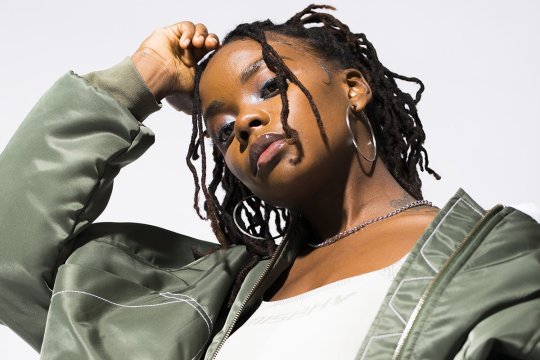
As Toronto grows and gets more expensive, there’s angst about displacement of DIY communities and spaces for creativity to flourish. But we’re still thriving. Globe-trotting sounds are meeting on the dance floor, toxicity is being worked out through rockstar swagger, disco is returning to its radical roots.
Here are eight snapshots of artists pushing the scene forward and more to watch in 2020. The music they’re making is strong, vibrant and diverse – the whole world in one city’s music scene.
The sound: Dance music for rule-breakers
Bambii is part of the lifeblood of Toronto’s dance music scene. She’s a leader in the collective of cool, queer and diasporic DJs who are working to make the city’s dance music culture reflective of their realities.
Committed to Black women and queer folk from the very beginning, she’s turned her biannual party, JERK, into an institution. Known internationally for genre-defying sets, she’s left a string of sweaty dance floors from Berlin to Ho Chi Minh City. But in 2020, she’s stepping away from touring as a DJ to focus on releasing her own music.
Bambii calls her recently released debut single, Nitevision, a “future dancehall” track, which is interesting – considering she was adamant at the outset of her career about not being labelled a dancehall DJ. Being Caribbean, she was concerned she would be pigeonholed by narrow-minded categorization.
“I’m at a place now where I understand Caribbean music and diasporic music to be so vast in terms of something to reference or to be inspired by,” she says. “It’s just so rich. I no longer feel like I’m being put in a box.”
As a song and as a music video, Nitevision is an ode to Black women – to people Bambii admires, to her friends, to her community. It’s an ode to the dance floor as a conduit for powerful feminine energy.
“It just felt like it was the most sincere point I could make, coming out as a producer.”
And it’s just the beginning. She plans on dropping several singles this year. She says the songs will sound like her DJ sets. So expect more future dancehall, but also high tempo house, ballroom, Jersey club and reggaeton. She even hints at some songs using her own vocals.
Like the city she’s from, Bambii is perpetually evolving – she’s never settled on just one thing.
“The real Toronto, to me, just sounds like everything – which is what’s cool about it.”
Bambii has been in the party scene for years and the idea to produce came to her four years ago, but it took some time to conquer the intimidation of producing and get comfortable putting out her own music. But she also felt DJing no longer allowed her to express everything she needed to say and represent everyone she needed to represent. Her work has an overarching intention to reclaim Black women’s stories, and to counteract the narratives that are imposed on them.
“When I think about what inspires me or encourages me, it’s people suspended in joy and dance,” she says. “It’s what spaces feel like when there’s a majority of women in them, a majority of Black women.” KELSEY ADAMS
More Artists To Watch
Demiyah Pérez
A student of Intersessions DJ workshops led by Chippy Nonstop, Demiyah Pérez spent 2019 pivoting from being every Toronto DJ’s favourite dancer to a purveyor of sounds in her own right. Her sets, a high-energy mix of dancehall, reggae, house and hip-hop, cater to dancers who aren’t ashamed to leave it all on the floor. Last May, she helped launched Ahlie, a party series designed to create common ground between queer and straight people who love dancehall and bashment culture.
The brainchild of DJs Hangaëlle, Minzi Roberta and Kiga, Kuruza is a collective and a monthly party. Already the go-to Afro dance music party in the city, Kuruza settled into its new home at the Drake Underground late last year. Think African pop music, gqom, baile funk, Afrohouse, soca and dancehall. You can also catch them on underground radio station ISO Radio, where they spotlight different DJs and provide a glimpse into their events.
Sofia Fly
DJ/producer/rapper Sofia Fly's 2019 EP, Rosé, is a reflection of her trans Latina identity set to nebulous house and ballroom beats. Her inspired downtempo remixes of pop faves like Kehlani and Shakira to indie rap darlings like Princess Nokia prove she knows how to parse a song down to its core. Her live sets are opulently layered, genre-jumping feats, from hip-hop to disco to deep house.
Shan Vincent de Paul
The sound: Grimy flows and globetrotting beats
Shan Vincent de Paul’s ruthless collaborations with fellow Tamil musician Yanchan on Mrithangam Raps scored more than half a million views last summer. Fans ate up the video series in which Vincent de Paul’s staccato rhymes chase the percussion from Yanchan’s mrithangam (or mridangam), an Indian drum commonly used at Hindu weddings and Carnatic ensembles.
“It was an authentic bridge between the classic South Asian sound and modern rap,” says Vincent de Paul about the genre fusion that brought him back around to his Tamil roots.
Outkast, Hieroglyphics, Pharoahe Monch and their contemporaries are primary influences on the Sri Lankan-born, Brampton-raised refugee artist who has been grinding out music since 2005, first with Soliva Spit Society, then as half of experimental duo Magnolius and finally alongside the collective sideways.
“I never want to classify myself as a Tamil rapper,” says Vincent de Paul, about why he didn’t tap into his heritage until recently. “I want to compete with the best of them. [And] I always had this fear that if I was going to be speaking about our story, it’s going to be falling on deaf ears.”
His first two solo albums, Saviours (2016) and Trigger Happy Heartbreak (2017), scored with U.S.-based music blogs like Okayplayer and Afropunk. But as Tory Lanez, Drake or the Weeknd will tell you, homegrown love is hard to find.
He went beast mode on tracks like Die Iconic, unleashed bangers like Bitch Go and Warning Shot and lifted spirits with the refugee anthem Out Alive. But for years, Canada slept on him.
“The art I’m making is undeniable,” says Vincent de Paul, letting out his frustration about being ignored by the industry he once catered to. “I can out-rap 99 per cent of the people in this country. I’ll put that on my life. Canada has some of the best artists in the world, but our industry is a high school shitshow.”
Vincent de Paul eventually found support within the South Asian community, who were thrilled to find a brown rapper whose rhymes are tight. And then he hooked up with Yanchan. Their Mrithangam Raps paved the way for an upcoming tour through India in February and a collab LP called IYAAA dropping March 27. And in early summer Vincent de Paul will release his third solo album, Made In Jaffna.
“Now I don’t give a fuck about the Canadian industry,” he says. “Because I have all these other people that are legit supporting me and uplifting me.
“Now the Canadian industry is outnumbered.” RADHEYAN SIMONPILLAI
If you’ve seen their name in red stencil all over the streets of Toronto and wondered what the fuc Fuctape might mean, it’s an anonymous Toronto collective with over 30 members. None of them are identified, but listen to their album and scattered singles – all up on YouTube – and there are a few you might recognize. It’s somewhere between the give-no-fucks energy of early Brockhampton and Odd Future with the way-too-online pranksterism of Death Grips, with some other electronic and indie rock pastiche in the mix.
Swagger Rite
The first song on Swagger Rite’s The Swagged Out Pedestrian, released late last year on Sony, is called Mosh Pit – and that’s the vibe throughout the spare and bone-rattling trap of the five-song EP. The Jane and Weston rapper’s single In Love With The K was a viral hit on WorldStarHipHop and attracted Drake collaborator BlocBoy JB for a new version. His energy is infectious, and you can already see it starting to spread beyond Toronto.
Jon Vinyl
Jon Vinyl has a pretty good friend in his corner: pop sensation Shawn Mendes. The young R&B singer/songwriter got a shout-out from his old Pickering high school pal on Instagram last year for his Nostalgia EP, and the music stood up to the sudden influx of rabid Mendies (is that what his stans are called?). His upcoming single Moments (out January 31), produced by fellow Torontonian GOVI, shows his star potential – timeless smooth soul meets 2020 pop hooks.
Nyssa calls her music “repurposed rock.”
With her bleached-blond hair, intense eyes and undeniable swagger, she’s seven decades of rock star energy channelled into one person. You can hear it all in her electro-glam pop songs: outlaw country, 60s Motown, singer/songwriter folk, pulsing 80s pop and plenty of old rock and roll.
But there’s one thing missing: guitars.
“I’m not saying I’ll never use guitars. I mean, I love guitars,” says Nyssa. “But I want to challenge myself, and this kind of music is usually so guitar-driven, part of the challenge is to find that energy somewhere else. I want to take all the things I love and then break all the moulds so you hear them in a different way.”
As a solo artist, Nyssa has an EP, Champion Of Love, and a handful of singles to her name. But she’s a long-time veteran of the local rock scene. She fronted the girl group/rockabilly-indebted band the Superstitions (later Modern Superstitions) starting when she was 15 years old.
She’s been through the record-label wringer and is now purposefully independent and self-sufficient. She produces all her music herself, and even her powerful and intense live shows are 100 per cent solo – though she cherishes the visceral communal experience of live music.
One collaboration Nyssa does have on the way is with Meg Remy of U.S. Girls, who co-produced her cover of Ann-Margret’s psychedelic Lee Hazlewood collaboration It’s A Nice World To Visit (But Not To Live In). That will appear on an upcoming vinyl box set from local label Fuzzed and Buzzed and also on Nyssa’s otherwise self-produced debut album, Girls Like Me, which she plans to release sometime this year. The songs, all primarily beat- and lyric-driven, tell the stories of female outcasts at odds with the modern world.
Nyssa is long-time regular and now co-organizer at Dan Burke’s annual Death To T.O. Halloween shows, where local musicians dress up and play full sets as other bands. She’s channelled Rod Stewart, INXS, Robert Palmer, Mick Jagger and Elvis. This year, for a special Valentine’s Day edition, she’ll perform as Meatloaf. She always chooses artists she wants to “become a little bit,” and it’s inspired her own music, but she won’t forget the baggage that comes with it.
“In rock and roll we still have all these very out-of-date male archetypes of excess. Just pure appetite,” she says. “And there are obviously a lot of troubling stories.”
“So I would like to take the good and the fun and the no-holds-barred sexuality and take away all of the uh…” she pauses for a second, searching for the right word and then lets out a bemused laugh, “...horrible bullshit.” RICHARD TRAPUNSKI
Nyssa plays (as Meatloaf) at Death To T.O. On Valentine’s Day on February 14 at Lee’s Palace.
More Artists To Watch
Jesse Crowe launched Praises to focus on more personal inner questions about gender expression and health than they could tackle in their main project, Beliefs. But with the recent Hand Drawn Dracula release of the addictive three-song EP Three – co-produced by their Beliefs collaborator Josh Korody – it’s overtaken that shoegaze band as the project to watch. The songs are stark and dramatic, minimalist and heavy, with a voice that makes you stop dead in your tracks. After recuperating from cancer surgery, Crowe will return to the stage this year and finish the follow-up to their 2018 debut album In This Year: Ten Of Swords.
Praises plays the Monarch Tavern on March 27.
Cindy Lee
Patrick Flegel, formerly of the short-lived but influential Calgary post-punk band Women, calls Cindy Lee the culmination of a lifelong exploration of guitar, queer identity and gender expression. The songs on the upcoming album What’s Tonight To Eternity (out February 14) are ethereal in the literal sense, exorcising ghostly echoes of the Supremes, Patsy Cline and Karen Carpenter – pop’s uncanny valley.
Scott Hardware
After a stint in Berlin, electronic art-pop artist Scot Hardware has spent the last few years back in Toronto making his new sophomore album Engel (Telephone Explosion), and he’ll release it on April 3 before another extended jaunt in Europe. Inspired by Wim Wenders’s film Wings Of Desire, it’s an eclectic and uncategorizable piano-and-strings-speckled meditation on queerness, shame, death and the afterlife.
Scott Hardware plays at the Boat on January 30.
The sound: Soft sounds for the comedown
Ziibiwan is an electronic musician, but they don’t make music for the club.
“[Musician/artist] Melody McKiver explained it nicely: [my music] is what you play after the club when you’re like, ‘I’ve had too many gin and tonics and I need to chill out,’” Ziibiwan says with a smile.
While living in foster care, music was a release for Ziibiwan. They played piano and guitar, and later experimented with electronic music through a digital audio work station. They covered Radiohead and Foo Fighters songs, and were enamoured with whatever was playing on BET. But it wasn’t until they moved to Jane and Finch that Ziibiwan made their own music.
“I was working at Loblaws on St. Clair West, doing the graveyard shift, and I would commute from Jane and Finch. I was on my laptop most of the time and I would record everything,” Ziibiwan says about the making of their 2016 debut EP Time Limits, a collection of beat-centric songs that evoke textured imagery.
“There were a lot of problems going on in my life then, and I felt like the land was giving me something. Not just the land but the cultures around me at Jane and Finch,” continues the musician, who’s currently living in Hamilton to care for their family. “It was one of the most beautiful experiences I’ve had in my life.”
Following the EP’s release, Ziibiwan, who also performs as DJ Nimkiiwitch, opened for acts like A Tribe Called Red, played at Venus Fest and composed scores for two short animated films by Amanda Strong. Next month, Ziibiwan and McKiver will perform their original score for the play God’s Lake as it tours throughout British Columbia. This week at the Music Gallery, Ziibiwan will celebrate the release of their new album, Giizis.
Ziibiwan describes Giizis as more soft and introspective than their previous music, and it will feature their voice for the first time. For Ziibiwan, Giizis – an Anishinaabemowin word they define as, “the moon, the sun and the eastern direction, which is all kind of a new beginning” – is the start of a new and more intimate creative chapter.
“I want to introduce this version of who I am to people because people don’t really know me beyond making beats,” they explain.
“My friend once said that we don’t have to always be performative with [our] Indigeneity and we also don’t always have to protest in our music. That’s what most Native rap is. It’s always they, they, they and us. It’s always plural and not really introspective at all.
“We deserve our own music.” LAURA STANLEY
Ziibiwan plays an album release show on Saturday (January 25) at the Music Gallery at 918 Bathurst with Phèdre and Melody McKiver.
More Artists To Watch
Xuan Ye
Interdisciplinary artist Xuan Ye approaches sound manipulation with boundless curiosity. The improvised electronic pieces on her debut LP xi xi 息息 (out now via Halocline Trance) shudder, whine, whisper and shout. The detailed sonic layers force you to drop everything, breathe and listen.
Xuan Ye performs as part of Convergence Theory on Saturday (January 25) at the Victory Social Club.
Astro Mega
Listening to Astro Mega’s (aka Jermaine Clarke) extensive catalogue of songs feels like slipping into a warm bath while a party happens on the other side of the door. His 80s- and 90s-hip-hop-inspired beats are muted and chill, often with a collage of sampled voices. Listen to 97’ Kobe from his recent LP GodBodyDevine if you want a vivid memory of playing NBA Live 97 in somebody’s basement.
BisonBison is a new multi-genre collaborative project between electronic producers Dani Ramez (Spookyfish) and Chad Skinner (Snowday) with producer and drummer Brad Weber (Caribou), multi-instrumentalist Sinéad Bermingham and vocalist Sophia Alexandra. On their upcoming debut album Hover (due out February 7), they meld the gentle sensibilities of folk with disquieted electronics in hypnotic convergence.
BisonBison play a release party on February 1 at the Garrison with ANZOLA and Kira May.
Luna Li
The sound: The all-ages scene grows up
As a teenager, Hannah Bussiere Kim straddled two worlds. Her mother ran a music school in Roncesvalles, and she trained in classical piano and violin, taking Royal Conservatory exams and performing at recitals. On weekends, though, she was at DIY shows at now-shuttered all-ages venues like D-Beatstro and the Central.
She left Toronto to study violin at McGill, but dropped out after one semester. She wanted to start her own band.
In 2015, she started a garage rock group, Veins, which morphed into her solo project Luna Li two years later.
“When I was first starting out, I thought, ‘Rock and roll is cool, the violin is not,’” says the 23-year-old. “It took me a long time to figure out how to incorporate my classical background into Luna Li.”
On her debut full-length, to be self-released this spring, she combines swelling psychedelic guitar and chiming keys with soulful orchestral arrangements of violin, harp and cello. She enlisted her brother, Lucas Kim, to play the cello and her producer, Braden Sauder, for drums. Everything else she plays herself. And she’s putting new parts of herself into the songs, too.
“Many of my older songs were crafted out of poems or were vague in meaning,” says Bussiere Kim. “A lot of [the new ones] deal with mental health, loneliness and friendship. They’re more direct and clear, and vulnerable.”
She’s also inspired by a new wave of Asian American female musicians like Japanese Breakfast, Jay Som and Mitski. “I’m half-Korean and that kind of representation – of actually going to shows and seeing people who look like me – was key,” she says. “When I was in high school, I never saw a band fronted by an Asian person.”
Last fall, Luna Li played festivals almost every weekend with her live band – Sauder, Hallie Switzer, Charise Aragoza and Sabrina Carrizo Sztainbok – and landed big opening slots for bands like Hollerado.
She’s still involved in the tight-knit all-ages scene from her high school days. It’s just all grown up now.
In addition to Luna Li, she plays guitar in the psych band Mother Tongues (also with Aragoza) and drums in the art pop group Tange, which is made up of ex-Pins & Needles members Deanna Petcoff and her Luna Li bandmate, Carrizo Sztainbok. Meanwhile, her boyfriend Jacob Switzer plays in indie rock group Goodbye Honolulu.
In 2020, she plans to focus on Luna Li and tour in the spring when the album is out. And hopefully, many of those shows can be all-ages.
“It’s hard to do all-ages shows because so many DIY spaces have shut down,” says Bussiere Kim. “But it’s really important that everyone feels welcome at my shows, and that includes young people.” SAMANTHA EDWARDS
More Artists To Watch
Goodbye Honolulu
While they were still in high school, Jacob Switzer, Emmett S. Webb, Max Bornstein and Fox Martindale started Goodbye Honolulu and the label Fried Records as a home for their music and their friends in the all-ages scene. The garage rock band has a penchant for punchy riffs and gang vocals, and it’s taking them beyond the city. Next month, they’re supporting the Beaches on their cross-country tour and then heading down south to play SXSW.
Goodbye Honolulu opens for the Beaches at Danforth Music Hall on February 28 and February 29.
This year brings good news for longtime fans of Sam Bielanski’s grunge-pop project. After two EPs, countless Toronto shows and playing in Pretty Matty’s live band, Pony’s finally releasing their debut full-length this year. On the woozy first single Limerence, Bielanksi sings about the crushing feeling of unrequited love. Fittingly, this February she’s playing the emo-themed tribute night Taking Back Valentine’s Day (February 14 at Junction City Music Hall) in a Paramore cover band.
Moscow Apartment
In the three years since Brighid Fry and Pascale Padilla formed their indie folk-rock band Moscow Apartment, they’ve released their debut self-titled EP, won a Canadian Folk Music Award and toured across the country – all before they graduated high school. This spring, the teenagers are releasing their sophomore EP and playing shows during March Break (they’re still in high school, after all), while being outspoken advocates for the all-ages scene and climate justice.
Moscow Apartment plays the Paradise Theatre on January 30.
The sound: Disco reconnected to its roots
A half century after the heyday of disco, Tush is helping the genre stay alive.
The project, which started as a seven-piece live disco band called Mainline in 2015, now consists of just two core members: vocalist Kamilah Apong and bassist Jamie Kidd.
While their music draws from funk and soul and follows the four-to-the-floor beat typified by disco, they’re more than a vintage throwback.
“Disco is such a loaded term,” says Apong, who previously played in the band Unbuttoned. “For us, it means thinking about how music was made in the origins of [the genre] and keeping to those practices, which was experimentation and [that it was] so much of a social, cultural music.
“Black women were such a huge cultural connection, and disco is deeply ingrained in Black and queer communities.”
Naming Universal Togetherness Band and the Brothers Johnson as some early influences, Tush released an EP, Do You Feel Excited?, in 2018. Their latest single, Don’t Be Afraid, is an atmospheric slow burn propelled by Apong’s gospel-style vocals exhorting us to love defiantly. This summer, they’re planning on releasing their first full-length album.
“What we strive for is depth in the music, lyrics and themes that you don’t find in what most people think of as disco – like more of the later, whitewashed, commercial stuff,” Kidd explains. “We’re making lyric-based dance music that incorporates live instrumentation and more contemporary electronic techniques.”
Tush are a versatile band, and they’ve performed in grand ballrooms like the Palais Royale, rock clubs like the Baby G and underground warehouse parties. Recently, in order to tour more freely and take on gigs at intimate clubs, they’ve distilled their seven-piece live band into a live PA trio that includes Alexa Belgrave on keys.
Kidd, a veteran of Toronto’s electronic scene who co-founded long-running event promoters Box of Kittens and puts on their popular Sunday Afternoon Social parties, has witnessed the gradual loss of the city’s live music venues, especially those accommodating of dance music. But his genuine love for the local scene and all the talent in it encourages him to continue on.
“Something I’ve always strived for is authenticity and doing it for the right reasons,” he says. “With Tush, we’re just doing what we feel most connected to.”
Apong agrees, adding that there’s strong support for contemporary disco in the city. “Everyone dances, no one’s trying to flex or look cool,” she says. “When we throw our own shows, our people show up.” MICHELLE DA SILVA
More Artists To Watch
Born Ryan Anthony Robinson, R. Flex is a queer Black singer, electronic producer and cabaret performer blending R&B and dance music. A backing vocalist in Tush’s seven-piece live band, R. Flex released their own EP, In & Out, in 2018, and since performed in Glad Day’s Black Power Cabaret and at Queer Pop: LGBTQ+ Music & Arts Festival.
Catch R. Flex singing covers as part of Just Like A Pill on January 31.
The DJ, producer, composer and keyboardist born James Harris has been releasing music spanning disco, funk, deep house, dub and jazz since his 2017 debut EP, Memoirs. When he’s not performing or creating visuals for the electronic monthly Astral Projections, he’s co-running Cosmic Resonance, Toronto’s most exciting progressive jazz-fusion electronic label.
Babygirl
One of Toronto’s hardest-working DJs, Katie Lavoie is a fixture on the queer dance party circuit. Catch her spinning everything from Hi-NRG to juke house, pop bangers and big gay anthems at her monthly residency Freak Like Me at the Black Eagle, and on her ISO Radio show Therapeutic Hotness. Babygirl is also part of the team at Intersessions, which teaches women and LGBTQ-identifying folks how to DJ.
Babygirl plays Freak Like Me with Chippy Nonstop and Karim Olen Ash this Friday (January 24) at the Black Eagle.
The sound: Exploding the “Canadian sound”
Haniely Pableo is a cardiac nurse by day, rapper by night. As Han Han, she sings and raps in Tagalog and Cebuano, challenging notions of what makes music “sound” Canadian.
Hip-hop once seemed like an unlikely career for Pableo, but she’s driven by a desire to overthrow patriarchal-racist-exploitative systems. She enjoys creating positive change through challenging conversations, like one she recently had with a man in Tanzania.
“He said that his daughter could go to school and get educated all she wants but when she’s home, she needs to respect and serve her husband,” she recalls. “I argued with him – wouldn’t he want his daughter to be treated like an equal by the husband, [not] a servant? We went on and on.
“I [have] a lot of conversations like this when I travel or go home to the Philippines.”
Her passion for changing the narrative first collided with Toronto’s arts and music scene in 2006, when she immigrated to Canada and took a poetry workshop. After years of performing around the city as part of the collectives Santa Guerrilla and PSL (Poetry is our Second Language), she released her self-titled debut album in 2014. On her upcoming second album, URDUJA, she delves even deeper.
“Each song is different, but [it’s] mostly about the complexities of being a woman,” she explains. “How to be strong. How to be vulnerable. That you can’t always be fierce.”
Inspired by her late grandmother, she named the album after the folkloric Filipino warrior princess revered for power and leadership.
“She’s the opposite of the stereotype that we have today – that Filipina women have to be submissive and happy. That’s what I want to manifest on the album, that we’re more complex. We can be angry, sad, happy, confident and all those emotions exist on an equal spectrum.”
Pableo, who will play a Venus Fest-presented release show with fellow Filipina-Canadian acts Charise Aragoza and sketch comedy troupe Tita Collective, hopes it also challenges the idea that there’s such a thing as a unified Canadian sound.
“We’re missing out on a lot of talent and creativity [when] we stick to a narrow-minded view on what Canadian music is and is not. It’s not progressive or empowering to those communities who are always neglected and ignored,” she argues. “Canada always prides itself [on] diversity and multiculturalism, so it should follow naturally that the music scene reflects those values.”
Pableo acknowledges a growing celebration of diverse Canadian music and cites acts like Maylee Todd as important trailblazers. But she’s committed to making her music until she’s just one of many.
“My hope is that Filipino-Canadian music and talent [become] appreciated, recognized and respected. That’s my personal goal. That’s why I’m still here.” CHAKA V. GRIER
Han Han plays an URDUJA release show at Lula Lounge on January 30.
More Artists To Watch
Honest, empowering lyrics. Self-love and body positivity. A voice that blows the roof off. No, it’s not Lizzo. It’s LU KALA. The Congolese-Canadian singer is known for her flaming orange hair and songs like DCMO (Don’t Count Me Out) that you want to cry and dance to. She’s worked behind the scenes as a songwriter, and now she’s preparing to release her debut album. Its first single, Body Knew, will be out next month.
Duo Elizabeth Rodriguez and Magdelys Savigne released their lush debut, Sombras, in 2019. OKAN's vocal- and percussion-driven tracks evoke their homeland yet also reflect the vibrant Cuban-Canadian community. On their album artwork they’re in full Latin garb, perched regally against a snow-covered landscape – the perfect illustration of their sound. This summer they’ll release their sophomore album, Espiral, and tour through North America and India.
Amaka Queenette
In the summer of 2018, Amaka Queenette quietly released her astute and far-too-brief Vacant EP. At just 19, the Nigerian-born singer’s lyrics and voice hold the composure of someone twice her age. Soulful and elegant, she moves between jazz, R&B and gospel with ease while singing about isolation and soul-searching. This spring she’ll release a visual EP, Fleeting, Inconsequential.
The sound: Heavy psych from the depths
Paul Ciuk laments the lack of meaningful connections in Toronto’s music scene.
“The sense of community we have here is totally broken,” explains the drummer for proto-metal quartet Häxan.
In the band’s experience, power dynamics are often unbalanced and musicians are reluctant to help others unless it helps themselves. But Häxan has seen that there’s an alternative – they’re proof of how supportive a small but dedicated community can be, especially if they have a space to congregate.
Though some of the friendships in Häxan span decades, the real genesis of the band happened at now shuttered Kensington Market metal venue Coalition. In 2015, with only a theatre degree in her performance arsenal, vocalist Kayley Bomben (also one of Coalition’s founding bartenders/promoters/managers) made the leap to front a Germs cover band with guitarist Paul Colosimo and bassist Eric Brauer for a one-off covers night.
“Coalition acted like a big tent because you could see all different kinds of metal there,” Brauer explains. “It was a pivotal venue for us to be able to work out the band dynamic,” Bomben agrees.
Häxan matured from punk cover band to Stooges-inspired grunge act and slowly conjured the fiery intensity of the psychedelic metal they play now. After finalizing their lineup with Ciuk, they quickly slipped into a heavy vintage groove.
A fascination with the occult didn’t hurt, either. Their name is a reference to a 1922 silent film that explores how superstition wrongly linked mental illness to witchcraft. “When we think of people as evil because they’re different, that leads to a lot of horrible things,” Bomben says.
Their debut album, set to be released this spring, furthers the fascination. It’s named Aradia, after a tome of Italian folklore that positions witchcraft against hierarchy and oppression. (The first single, Baba Yaga, just dropped on Bandcamp.)
The album was produced by Alia O’Brien of Badge Époque Ensemble and Blood Ceremony, who knows a thing or two about how pagan rituals and witchy vibes should sound. Häxan credit that connection to Fuzzed and Buzzed. The local label took a chance on them early, putting them on last year’s half-cover/half-original Altar Box 7" compilation where the band first collaborated with O’Brien.
“Nobody has ever done anything like this for any of our other bands before,” Colosimo says. Bomben agrees, pinpointing the key to thriving in the city’s metal scene. “You really have to find the people who are willing to help each other out.” MICHAEL RANCIC
More Artists To Watch
Look out for this mysterious project to make waves later this year. More within the psychedelic camp than metal, ROY still bring plenty of heaviness – biting, raw guitar lines rendered through a thick cloud of analog tape haze. But they temper that weight with dreamy keyboard-conjured paisley sublimities. Think the schoolhouse rock of Darlene Shrugg, or the dense psychedelic tapestries of Tony Price.
Rough Spells
Häxan’s Fuzzed and Buzzed labelmates occupy similar psychedelic and doomy territory and also have a full-length ready. They match Häxan’s occult metal intensity with stellar vocal harmonies and incisive lyrics. Their most recent single, Grise Fiord, is named for Canada’s most northerly community and a site of forced Inuit relocation in the 50s. All proceeds from the track go to It Starts With Us, an organization that honours the memory of Missing and Murdered Indigenous Women, Two-Spirit and Trans people.
Erythrite Throne
Mysterious figure Wyrm has completely thrown themselves into the dark and dank atmospherics of dungeon synth, a black-metal-adjacent style that emerged in the 80s. They’ve released a ridiculously prolific amount of music in little over a year under the Erythrite Throne moniker: 18 albums on Bandcamp starting in 2018, including one on January 1 of this year. Don’t be overwhelmed: their mostly instrumental music is moody and wholly engrossing. Start with The Blind Hag’s Lair.
This content was originally published here.
1 note
·
View note
Text
on why queer isn’t a bad word
I’ve read quite a few posts from either viewpoint and so far I’ve kept my mouth shut on how I feel about this because I didn’t want to polarize - but lately I’ve seen more and more of the “but it’s a slur!!!” arguments and couldn’t take it anymore. I went on a twitter rant but promised to make a more organized and put together post so here we go. (it got quite long, I apologize)
there are a lot of wonderful posts about this out there already but I decided to still mention the points made there because honestly the more people hear it the better. feel free to approach me and I’ll link you to some of those other posts!
as a little backstory:
I’m from Germany - aka a non-English speaking country and that actually plays a part in it but more on that later.
I’m in my mid-twenties and I’ve identified as queer for about 7ish years now. I used to be very well connected in the community, especially the trans community and had some older friends who were there in the beginnings of our (German) community. so I know the history.
okay so, I’m just gonna list some points now in no particular order:
1. yes. queer is used as a slur. so is gay. so are basically all the other identities we have. because some straight people are assholes and are afraid of everything that’s different.
BUT. queer has been reclaimed AGES ago. our forebearers fought long and hard to take it BACK from the straight people who stole it to hurt us. freely handing it over to our opposers now would be nothing short of trampling on our community’s history and invalidating the sacrifices the generations before us have made.
also. “queer history”, “queer cinema”, “queer studies” are all legitimate (academical) terms. academics don’t cuss in their descriptors (and college courses).
2. queer is so much more inclusive than lgbt(+) or any of those acronyms. sure you could go lgbtqiaapf... but honestly that’s getting a bit ridiculous and frankly confusing. so for the sake of this argument we’ll stick with the “original” acronym LGBT. it mentions all of four identities. FOUR. out of the multitudes there are. I personally happen to have one of my identities mentioned there. that’s not a lot. but still, it’s something. my aroace nonbinary friend doesn’t have any.
“but there’s the plus!” you say. great. a plus. lovely. how would you feel being represented by a plus that doesn’t tell you anything about what it actually means? exactly. that’s not representation at all. who tf even knows what that plus means. no mention of nonbinary people, fluid people, pan people, ace people, aro people, and the list goes on and on.
that’s why it’s an amazing umbrella term. everyone can find a place in it.
3. it’s welcoming. this point is kind of tied to my second one but it’s important in its own right so I decided to give it its own number. it’s welcoming to questioning people. you know you’re different? not straight? but are you pan? are you bi? are you ace? or maybe aro? are you trans? are you non-binary? who the fuck even knows. it’s hard. I’ve been through multiple of these and it SUCKS. so having a community who goes “hey we don’t care how exactly you identify, we don’t mind if you haven’t figured it out you, you have a place here, you’re safe here and no one is gonna police your identity or gatekeep you” is super important. trust me.
4. it’s often easier. if I want to let somebody know I’m “not straight” without going into the details of my identity, queer is just a lot simpler and the other person will immediately understand what I mean. sometimes I just don’t wanna let somebody know all of my identities. sometimes I really don’t feel like educating people on all the terms I use. but I still want to let them know I’m part of the community. and honestly sometimes saying “hi so I’m a pansexual gray-aro gender-nonconforming trans guy” is too tiresome/long. “hi I’m queer” is concise and understandable to pretty much everyone.
sure, if you’re a cis gay dude, lesbian or bisexual person you can just use one of those words - good for you (no really, it is good for you and I’m happy you have these terms). but who tf (that isn’t as deep in the community as I am and/or on tumblr) is gonna know what I mean when I talk about my identity? fucking no one. you can’t really use “I’m LGBT” as a descriptor for yourself. saying “I’m gay” doesn’t work either cause then a) I might feel weird cause I don’t actually identify as gay and b) there’s gonna be shouts of “but you’re not gay, you’re not allowed to use that word!” - well what am I gonna use then? exactly. QUEER.
that’s where my nationality comes in as well. here no one knows what the fuck ace / aro, nb or even pan is. but they know what queer is. it’s like that in a lot of the non-english speaking world. get out of your US sometimes, folks.
5. this one is near and dear to me. queer is so much more than just an identifier telling people you’re not straight. it’s more than a label. more than a community. especially in the beginnings of our history it was most often used to denote that you’re different. you’re not the norm. and you don’t wanna be. you’re proud of being different. you’re celebrating being different and you’re not ashamed of it. it means you don’t want to assimilate, don’t want to emulate the “normal” lifestyle, don’t want to be that “well, he has a husband but you know, he’s not really gay, he’s just like us” guy. (nothing wrong with having a house with a picket fence and two children though, okay, I never said that! I actually want that myself)
the celebration of difference has always been a strong suit in our community. and personally for many of us. this is where my other “oddities” and differences interwine with my queer identity. I suffer from anxiety. I’m kinky. I’m a witch, I’m questioning my religious beliefs, I don’t give a fuck about gender roles and I’m just a general oddball. and that’s how I LIKE IT. I’m good that way. heck, I’m fucking GREAT that way.
there are quite a few more arguments to be made for the word queer but these are the ones I feel are most important.
so yes, I’ve identified as queer for a long while and I will continue to do so. as well as use it as an umbrella term for our community. if you personally come up to me and ask me not to use the word queer for you specifically of course I’ll accept that - but don’t you dare tell me how I can and cannot identify myself and my community.
as cis gays and lesbians you might not need the word queer. and that’s good for you. (no really, it is). but as someone who isn’t one of these things, for so many of us, queer is a word we desperately need (for the reasons listed above and more). so PLEASE don’t take it from us. a lot of work and love went into that word and it would be devastating to lose all that love and hope and sacrifice.
we must not let this divide us. we must stay strong as a community, ALL of us, especially in the current times.
so no, I have never nor will I ever tag my identity as a slur and I urge you not to either. if for personal reasons queer is a triggering word for you, there are countless ways to get around that (just like with any other trigger - use tumblr savior, xkit or any other of those options). but don’t ruin it for the rest of us.
this has obviously just been my very personal opinion - feel free to add on to this!
I welcome discussion about it - with people who agree with me but also people who disagree - the only thing I ask is to please stay civil and not to become personally attacking.
thank you.
sorry for making such a long and personal post but I just had to after all this time.
so to end this with an all time classic:
WE’RE HERE, WE’RE QUEER, DEAL WITH IT.
#queer#lgbt#lgbtq#queer slur discourse#text#misc#long post for ts#queer blogging#(yes that's my tag for queer shit)
89 notes
·
View notes
Text
Transgender women of color are pioneers of the LGBTQ-rights movement. Why are they still fighting for their lives?
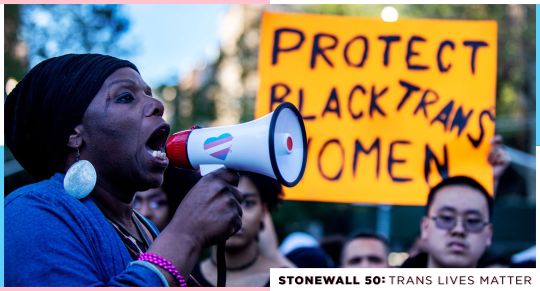
Transgender rights activists protest the recent killings of three transgender women, Muhlaysia Booker, Claire Legato, and Michelle Washington, during a rally at Washington Square Park in New York, U.S., May 24, 2019. (Photo: Reuters/Yahoo Lifestyle)
The start of LGBTQ Pride Month came with an exciting announcement in New York City: Two pioneering transgender activists, vanguards of the gay-liberation movement, would be getting statues in Greenwich Village, immortalizing their vital roles in the 1969 Stonewall rebellion — which has its 50th anniversary this year and is widely considered to be the official start of the movement.
“The LGBTQ movement was portrayed very much as a white, gay male movement,” Chirlane McCray, first lady of New York City, said at the official announcement. “This monument counters that trend of whitewashing the history.”
News of the statues, the first in the U.S. to commemorate transgender individuals, was celebrated on social media, where Raquel Willis tweeted, “Monuments don’t make up for the mayhem, but this is beautiful.” Many others, including Democratic presidential candidate Pete Buttigieg and Queer Eye costar Karamo Brown, weighed in with praise and shout-outs to the activists.
#HeyFriends... here’s some education on #Pride! Because I’m tired of this month passing year after year without acknowledging #MarshaPJohnson & the reason “Pride” began. pic.twitter.com/pFHWAmr1Ik
— Karamo Brown (@Karamo) June 3, 2019
Thanks to leaders like Marsha P. Johnson and Harvey Milk, I have faith in the possibility of change and growth in this country. There is still more work to do, but let us take a moment and celebrate the gains we've made this #PrideMonth.
— Pete Buttigieg (@PeteButtigieg) June 2, 2019
There would be no Pride Month without sharing our deep gratitude and respect for the transgender women of color who started it all, Marsha P. Johnson and Sylvia Rivera. Happy Pride Month! #StoneWall50 #PrideWasARiot pic.twitter.com/6SkdUgn3Ln
— سارة جهاد (@spoiledsoymilk_) June 1, 2019
We stand on the shoulders of giants. I am so happy to see New York City immortalizing Marsha P. Johnson and Sylvia Rivera. They gave so much to this world and community, we should all continue the work that would make them proud. https://t.co/DHo15fdrim
— Chasten Buttigieg (@Chas10Buttigieg) May 30, 2019
Still, there was a lot that the valiant effort could not make up for, and many wounds it doesn’t seem likely to heal — especially for people like Sharron Cooks, a transgender activist in Philadelphia.
Cooks spent June 1 eulogizing and then burying her dear friend, Michelle “Tameka” Washington, who was one of four black transgender women murdered, in cities across the country, within just 12 days of each other.
“On the first day of Pride Month, we laid our sister to rest,” Cooks posted on Facebook. “Pride Month will never be the same for me.”
Along with Washington, who was remembered by loved ones that day as “beautiful,” “outspoken” and “a mother figure,” the recent spate of murders has claimed the lives of Muhlaysia Booker in Dallas, Claire Legato in Cleveland and an as-of-yet unidentified trans woman in Detroit, all of whom were gunned down. A fifth transgender woman, Amber Nicole of Denver, was brutally beaten by two men outside a nightclub, leaving her with facial nerve damage and a broken jaw. And most recently, on June 3, the body of Chynal Lindsey, 26, was pulled out of a Dallas lake by police, showing “obvious signs of homicidal violence.”
The anti-trans violence has sparked a flurry of national media coverage, plus vigils and rallies across the country.
“We will not be erased!” yelled a fired-up speaker into a megaphone at one such demo — Keep Your Hands Off Trans Bodies in New York City, held on the Friday before Memorial Day. A crowd of nearly 300 had gathered beneath the stately arch of Washington Square Park, forming a thick ring around each speaker who spoke or screamed from the heart — “Stigma is weaponizing murderers!” and “Black trans lives matter!”
Some, like Olympia Perez of Black Trans Media, could not contain their fury. “Black trans people have been here forever — and on their backs, you guys stand!” She directed her rage at the many white and non-trans people who took up space at the front of the crowd, referencing the legacies of activists such as Johnson, who worked tirelessly for LGBTQ rights only to be found dead in the Hudson River, after a suspected but never-solved homicide, in 1992.
“Marsha!” Perez screamed in anguish, smacking the ground with an open palm, “Stand the f*ck up and show them!”
Four days later, hundreds of mourners filed into the Cathedral of Hope church in Dallas, where the funeral of 23-year-old Muhlaysia Booker received a crush of media attention (and even a subsequent social media post by none other than Prince Harry and Meghan Markle).

People protest the killings of transgender women this year during a rally at Washington Square Park in New York, U.S., May 24, 2019. (Photo: Reuters)
“She would always say, ‘Mama, I’m willing to die for my transition, my respect and what I believe in,” Booker’s mother, Stephanie Houston, told the crowd, which included lots of local and national press — interest likely piqued by the fact that Booker had been viciously attacked in a parking lot in broad daylight, in a video snippet that had gone viral just a month before she was killed.
Those recent scenes — of funerals and rageful rallies — have stood in stark contrast to the excitement oozing through many queer-activist circles, where preparations have been underway for a particularly auspicious Gay Pride Month: This year marks not only the 50th anniversary of the Stonewall Rebellion, which started when patrons of the Stonewall Inn bar pushed back against an anti-gay police raid, but of the arrival in NYC of the annual international WorldPride festival, from InterPride, after past stops in Rome, London, Tel Aviv and Madrid.
The entire month, and especially the last weekend in June, when the annual NYC Pride March takes place, will be a lavish display of dance parties, celebrity appearances, parades, film screenings, concerts, drag performances, rallies and, of course, marketing opportunities.
View this post on Instagram
A post shared by She/Folk (@she_f_o_l_k) on May 21, 2019 at 7:35am PDT
It’s pretty safe to say, then, that the commemoration of those so-called “riots” of 1969 is now more a riot of rainbows and glitter. And many transgender people, believing they’ve been left behind by the larger LGBT movement, are not feeling it.
“World Pride should be about re-shifting resources to those who need it the most,” New York Transgender Advocacy Group executive director Kiara St. James, organizer of Keep Your Hands Off Trans Bodies, tells Yahoo Lifestyle. “While cis[gender] queers will converge on NYC to celebrate Pride, the reason for having it was Marsha P. Johnson and Sylvia Rivera, two transwomen of color. Their ‘children’ are still dealing with lack of housing and healthcare and employment opportunities. So, celebrate Pride. But know that the community does not have equity.”

Elle Hearns, a social-justice organizer and founding director of the Marsha P. Johnson Institute, launching June 21, adds: “We all want to celebrate. I would love to get on a float and just really be happy going to Pride. But I also understand who's not there.”
TOO MANY MISSING
Media interest in anti-trans violence may be at an all-time high. But, says Hearns, “One of the biggest points is that this is actually been happening for decades.”
It’s only recently that statistics on transgender killings, believed to be widely underreported, have been more reflective of the reality. Since 2015, according to the Human Rights Campaign, an average of 24 transgender individuals have been murdered each year, and disproportionate numbers of the victims have been trans women of color. The deadliest year on record since then was 2017, during which activists tracked at least 29 such deaths, with killings by acquaintances, partners and strangers, some never identified. In 2018, there were 26 such recorded murders, and in 2019, so far, there have been seven.
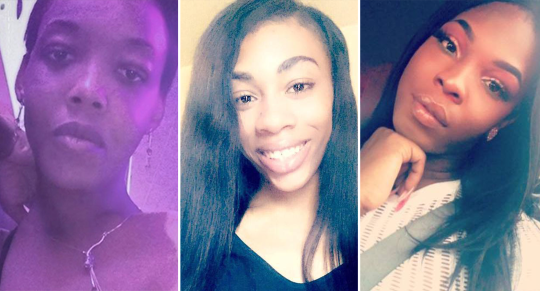
From left, Michelle "Tameka" Washington, Claire Legato and Muhlaysia Booker, all murdered within days of each other. (Photo: Facebook)
(And anti-transgender violence is, of course, not limited to the United States. A 2016 Transgender Europe report found that over 2,000 trans people had been killed since 2008, with Central and South America accounting for nearly 75 percent of those total trans killings; just last month, the body of a trans woman from Veracruz, Mexico, was reportedly discovered by police, beheaded.)
Further, the results of a 2015 survey (the most recent available) by the National Center for Transgender Equality found the following: that 20 percent of black transgender individuals were unemployed (twice that of the cisgender black population); 38 percent were living in poverty (compared to 24 percent of non-trans people of color); 42 percent had experienced homelessness; 53 percent had been sexually assaulted; and 6.7 percent were living with HIV — more than 20 times the rate of .3 percent in the general U.S. population.
There is also this shocking statistic, cited often by the country’s largest LGBTQ non-profits (though the exact source is not apparent): that the average life expectancy of transgender women of color is just 35 years old.
“One of the biggest problems that trans people face — more specifically, black trans women — is the lack of access to healthcare, employment, housing, social support and everything that can help an individual thrive,” transgender-rights activist and media personality Ashlee Marie Preston, who marked her 34th birthday last year by launching the hashtag “Thrive Over 35” to raise awareness of the short life expectancy, tells Yahoo Lifestyle.

Marsha P. Johnson. (Photo: Netflix)
“And what happens is, when you don't have access to housing, healthcare and employment or social support,” she continues, “you get caught up in the growth of the prison industrial complex. You have to engage in street economy, which adds an additional layer of risk to your life. And that cuts into your life expectancy.” Plus, Preston explains, “the fact that some people say ‘I experienced racism’ or ‘I experienced sexism’ or ‘I experienced a transphobia,’ many people aren't able to imagine experiencing all of those simultaneously.”
Sometimes, in fact, even with all that’s been gained since Stonewall — marriage equality, parenting rights, and various protections in employment, housing and healthcare — it can feel to some, especially transgender women of color, like not much has changed at all, particularly when one looks at the current administration’s anti-trans policies, which take away rights in areas of military service, healthcare and housing.
“For what good it did my trans girls, it might as well have not happened,” Miss Major, a longtime transgender activist and veteran of the Stonewall rebellion, told HuffPost in 2018 of the legendary uprising.
HISTORY REPEATING ITSELF
That feeling — that the “T” of LGBT is oft forgotten by the larger movement, and even more so for trans individuals who are not white — hits home especially hard if you watch the iconic, heartbreaking clip of Sylvia Rivera getting booed as she addressed the largely white, cisgender crowd at the 1973 Gay Pride rally in New York City.
“Y’all better quiet down!” Rivera screamed from the stage, accusing those rallying of belonging “to a white, middle-class white club.” She had joined forces with Marsha P. Johnson to form STAR (Street Transvestite Action Revolutionaries), a queer-youth advocacy group, but had to struggle with Pride organizers to get any time to speak at all. “I have been to jail! I have been raped!” she finally yelled into the mic, her voice raw with emotion. “I have been beaten! I have had my nose broken! I have been thrown in jail! I have lost my job I have lost my apartment for gay liberation — and you treat me this way? What the f*ck’s wrong with you all? I believe in gay power! Revolution now! Gay power!”
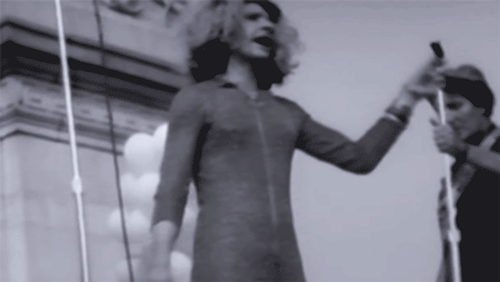
Sylvia Rivera onstage at NYC Pride in 1973. (GIF: Netflix)
In a later interview about that moment — footage that’s included in the 2017 David France documentary The Death and Life of Marsha P. Johnson — Rivera says that she went home from that rally and attempted suicide, and survived only because Johnson found her in time. “I was hurt, and I felt that the movement had completely betrayed the drag queens and the street people,” she says. “And I felt that the years I had already given them had been a waste.”
Decades later, many trans activists feel similarly frustrated and forgotten.
“It's very disrespectful to the legacy of the queer liberation movement when the LGBTQ community at large refuses to prioritize the wellbeing and survival of trans women of color — given that Marsha P. Johnson and Sylvia Rivera quite literally built the movement on their backs,” Preston says. “They started a nonprofit where they were just renting hotel rooms and apartments from the money they were making from sex work, so that they could take young LGBT kids off the streets who were kicked out by their families for being who they are.”

Sylvia Rivera in 1994. (Photo: AP Images)
Although Johnson and Rivera (who died of liver cancer in 2002) are often credited with actually sparking the Stonewall uprising — or throwing the first brick or Molotov cocktail, as the legends go — both denied having done so. They were certainly key players on the scene, though, and their years of advocacy both before and after are undeniable, hence the plans for NYC monuments.
But whether or not that sort of public acknowledgment or visibility translates into actual change is yet to be seen.
Some give big props to the strides made regarding transgender visibility in pop culture, most recently with the FX series Pose, kicking off its second season on June 11. The show, produced by Ryan Murphy and Steven Canals and written and directed by transgender pioneer Janet Mock, broke ground by casting actual transgender actors to play transgender characters, and tells the story of New York City’s 1980s drag ball culture — first told to a larger audience through Jennie Livington’s 1990 documentary Paris Is Burning, and thrust into the mainstream spotlight with Madonna’s “Vogue” that same year.
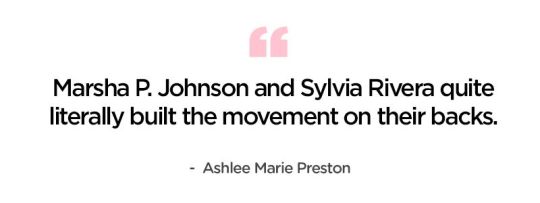
Mock spoke about the potential power of such representation on Pose on The Daily Show with Trevor Noah in 2018. “We have five women with different dreams, who have love, desire, who want to be desired, who are funny, who are villains,” she said, which educates viewers in many ways. “You show people that, number one, it’s not scary, that they’re not horrible people, that they’re not freak shows — that instead they’re humans that you care about… They’re invested, and I hope that it doesn’t just entertain and inspire, but that it also moves people to care and hopefully do something.”
Preston also sees Pose’s potential to change hearts and minds. “I think it underscores the level of humanity that is universal that anybody can connect to,” she says. “We all know what it feels like to be thrown away. We all know what it feels like to be discarded. We all know what it feels like to not know if you're going to survive or not. We all know what it feels like to want to be held and like want to have purpose and want to be seen.”
Still others are skeptical, including transgender artist and activist Reina Gosset, aka Tourmaline, who was speaking in general about visibility when she told Teen Vogue in 2017, “While trans visibility is at an all-time high, with trans people increasingly represented in popular culture, violence against us has also never been higher. The push for visibility, without it being tied to a demand for our basic needs being met, often leaves us without material resources or tangible support, and exposed to more violence and isolation.”
View this post on Instagram
A post shared by J A N E T M O C K (@janetmock) on Mar 31, 2019 at 9:27am PDT
And Hearns believes that the power of Pose may be overstated.“I think Pose is necessary, but I also see that organizing is necessary and [that it] doesn't change the conditions for everybody because there are five trans women who are stars on a show,” she says. “What's happening in the White House, Pose is not shifting.”
WHAT NEEDS TO CHANGE
Preston — who first gained wide recognition when she called out Caitlyn Jenner for being a “fraud” for her support of Trump in a 2017 video that went viral — does not mince words about who she believes is to blame for trans women of color being left behind by the LGBT movement.
“Every time that I hear another black trans woman was murdered, there’s this flame of rage that ignites in the pit of my belly, because I want to hold the other communities accountable for not showing up for us the way that we show up for every other community at the intersections of our identity,” Preston says. “I want to ask the LGBTQ community why they aren't prioritizing black trans lives. I want to ask the black community why we aren’t prioritizing black trans women. I want to ask women why we're still not considering trans women as women and as part of the larger national conversation around intimate partner violence, which is an extension of some of these deaths.”
“The truth,” she continues, “is that many gay white men use their sexuality as a shield to absolve them of the responsibility of dismantling sexist, racist and transphobic mechanisms within our community systems of oppression.” Instead, Preston says, some of these men believe “‘if I lean into my own oppression, then I don't have to do the work to liberate other people’… I'm not saying that [no] gay white man knows struggle. What I'm saying is that your race and your gender aren’t contributing factors to your struggle.”
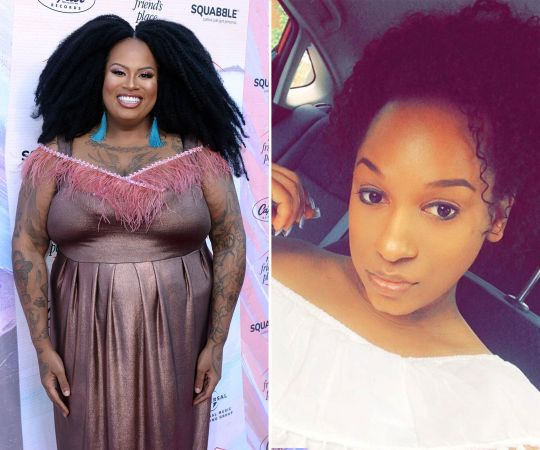
Activists Ashlee Marie Preston, left, and Elle Hearns. (Photo: Getty Images; Elle Hearns/Instagram)
Cooks, in the wake of her friend Tameka’s murder, tells Yahoo Lifestyle that she believes the answer is complex and nuanced, and that it partly lies within the trans community itself. “I think, ultimately, there is a lot of internal work that the trans community needs to do and that needs to be addressed,” she says, noting that, too often, trans women are killed by people they know. “Trans women have to do a better job at building our self-esteem and our self-worth, and not settling for less than we deserve.”
She also points a finger at various LGBTQ nonprofits, however, for not putting trans women of color into positions of power. “How many trans women do we have in the nonprofit world? How many are sitting on boards? A lot of the gay and lesbian and bisexual orgs aren’t really offering the economic opportunities.” (At the Human Rights Campaign, the “largest national lesbian, gay, bisexual, transgender and queer civil rights organization,” the executive staff and other higher-ups is largely white and cisgender, similar to the makeup at other national organizations, including the Family Equality Council, Lambda Legal and GLAAD.)
“A lot of these nonprofit organizations claim they are about the advancement of all LGBTQ people,” Preston also notes. “The reality is, they have a propensity to screen ‘black trans trauma porn’ to rake in donor dollars. But when it's actually time to benefit from those dollars, trans women of color are always at the back of the line.”
The scope of the problem is huge, Hearns, notes, because the LGBTQ movement, as she sees it, is not reflective of the communities it purports to represent. “My hope that the Marsha P. Johnson Institute will restore our belief that all of our people are worthy of everything — and in order to believe that, you really have to start with the people who have nothing. That is my take on Pride.”
That’s why Hearns is launching the Institute in the middle of June, she explains, “because we recognize how quickly the celebration will overtake what we understand about the history. Stonewall was a radical protest. It was a radical demonstration. It was a radical movement. And so, over the last 50 years, that movement has become not only sanitized, but it has stopped making radical demands, because of the desire to be seen as ‘normal.’”
It's why Pride, for Hearns and many other activists, such as the organizers of the Reclaim Pride Coalition in NYC and similar efforts across the country, are pushing back against mainstream festivities this year. “We are celebrating from very ahistorical perspective, and it's painful to just see the celebration and the corporations who have really embraced Pride — without actually embracing what they need to do to alleviate the reasons why Pride exists in the first place,” she says. “You cannot shake hands with the police and then use trans people in a campaign with rainbows on. That’s just not what this is about.”
Read more from Yahoo Lifestyle:
Photo of Sikh man’s ‘fantastic’ rainbow turban for gay pride goes viral: ‘Awesome message’
Man’s plan to hold Straight Pride Parade in Boston faces backlash, mockery: ‘This is tragically sad’
Trans teen Jazz Jennings makes inspiring valedictorian speech: ‘Follow your dreams’
Follow us on Instagram, Facebook, Twitter and Pinterest for nonstop inspiration delivered fresh to your feed, every day.
yahoo
#_revsp:wp.yahoo.style.us#_uuid:0d376664-8695-3daa-a883-ea460f525863#Stonewall 50#LGBTQ#_author:Beth Greenfield#LGBTQ Pride#Stonewall#Marsha P. Johnson#Gay pride#_lmsid:a0Vd000000AE7lXEAT#WorldPride
0 notes
Text
It's time to reclaim singledom as a symbol of power

"Are you swiping?" my best friend asks me over breakfast one morning. I gulp down a spoonful of woefully bland porridge and think for a moment about how to reply.
The answer was no, I wasn't swiping. But in saying so, I was met with a bewildered expression. I'm reluctant to swipe these days, or just to date in general, due to a long, troubling pattern of power imbalances that have occurred in every single relationship I've had since I started dating when I was 15.
Now, at age 30, my status as the perennial singleton is firmly established after taking countless protracted hiatuses from dating. Not because I don't like the idea of being in a couple, but rather because I find dating really hard. Let's be real, it's a truth universally acknowledged that dating is plain sailing for literally no one. But, as a woman who dates men, I've found that every breed of relationship I've ever had — from casual sex to long-term relationships — has felt completely antithetical to the vision of equality I've envisaged for my own life. The lack of agency I feel in my love life made me want to remain single just so I could cling on to any semblance of control. So, in order to avoid feeling disempowered, I have periodically opted out of dating.
It strikes me as odd that even in 2019 — in this new wave of the women's movement — my lack of a partner renders me something of an anomaly, an outlier among my friends and family. For decades, we've been trying to rebrand the trope of the single woman from sad lonely spinster to something more reflective of reality: an independent, discerning woman who is resistant to the pressures of the patriarchal social values we've inherited. But, is this rebrand even working? Because, from where I'm standing, the very same pressures Bridget Jones and Carrie Bradshaw were up against in the '90s and '00s feel just as prevalent today.
At every single step of dating and in every genre of relationship, I come face to face with power disparities and micro-aggressions that are tinged with misogyny. During my last serious relationship, my boyfriend hurled gendered insults — "bitch," "crazy," "insane" — at me when I tried to assert myself or express that I wasn't happy about something. He would openly objectify my female friends, appraising their physical attractiveness with nominal values. I dumped him and vowed to be more discerning about the next man I called my boyfriend. The next person I dated rolled his eyes when I spoke and replied "come on, Rachel" when I asked questions about subjects I didn't know much about. The realm of online dating brings other headaches, like being pressured by matches to send nudes, receiving unsolicited dick pics, and harassment, and verbal abuse if I take too long to reply to messages or don't want a second date.
In my sexual experiences with men, a marked power imbalance has left me feeling vulnerable and, at times, traumatised. When I look back on past encounters through a post-#MeToo lens, I can see that a troubling proportion of my sexual experiences fell into what I'd characterise as "grey areas"— sex that's non-criminal, but can feel violating. I experienced coercion, pain, and violence during sex that caused me trauma. During one experience, I asked the guy I was having sex with to stop because I had changed my mind. He proceeded to shout at me and yell insults until my housemate intervened and helped remove him from our house.
Perhaps it's me, perhaps I'm picking the wrong men, I've told myself countless times. In an attempt to address those concerns, I have re-calibrated the choices I've made in selecting a partner. A few years ago, I vowed to only date men who identified as feminists, but in venturing down this path, I encountered a slew of other hurdles, principally so-called performative wokeness. This term, which has recently entered the popular lexicon, refers to people who publicly claim to care about social justice, they identify as allies to women, people of colour, LGBTQ people, and people with disabilities. In some of my liaisons with men who identified as feminists, their behaviour during our relationship ultimately did not match the values they purported to hold. Behind closed doors, there'd be micro-aggressions like gaslighting and subtle ways of patronising me that made me question my own intellect.
SEE ALSO: Stop telling women how they should talk
In reality, it's far more complex than simply the choices I make about the type of guys I go for. Humorist and author Blythe Roberson, author of How To Date Men When You Hate Men, says dating is hard for everyone, but "dating as a straight woman is complicated by the fact that the gender you're attracted to has vast systemic power over you."
"This can manifest in large ways, but also in more insidious ways I used to brush off: men saying they could never be in a relationship with someone more successful than they are, or men treating me as frivolous for thinking and writing about dating at all," says Roberson.
My experiences are, of course, not representative of all men. Nor do they represent the experiences of all women. Trans women who date men face a different set of challenges when dating, chief of which is being sexualised but not respected.
Paris Lees, British Vogue columnist and trans awareness campaigner, says there are some men who are happy to have sex with trans women, but feel shame about dating trans women in a serious capacity. "It's really interesting when you tell guys that you're trans because immediately it's like, 'Oh we don't have to treat you with as much respect now.' Not all of them, but a lot of guys, they think 'Oh, this is the one I'm gonna fuck, but I'm not gonna take home to meet mum and dad.'"
She believes the conversations surrounding whether or not trans women are "real women" have heightened misogyny for trans women. "At the height of the 'are trans women real women' debate in the British media about a year ago, I was actually dealing with bullshit from a man and I just remember thinking, 'This is bullshit,'" says Lees. "Seriously, these people are telling me I'm not a real woman, and I'm out here getting all the misogyny."
Indiana Seresin, an academic specialising in feminist and queer theory, says she believes that "heterosexual dating is often just tiring for women."
"Dealing with issues like men's entitlement, the unequal division of physical and emotional labour, and men's ignorance about women's sexuality is exhausting," Seresin tells me. "As a queer woman I can confidently say that we don't face a lot of these issues, thank God. On the other hand, there are still cultural norms that we've regrettably inherited from heterosexuality, one of which is the couple form itself."
Rebranding the trope of the single woman
The hegemony of the couple form is something we, as a society, are struggling to shed. And it's standing in the way of our perceptions of what it means to opt out of traditional dating structures, like not participating in dating. When we look back on the pop culture poster girls for singledom — Jane Eyre, Elizabeth Bennett, Carrie Bradshaw, Bridget Jones, Kat Stratford — all their stories end happily with them finding Mr. Right. The story ends with these shrewish bluestockings finding a cure for their ailment — and that cure is a man. Not only do I not want to take this medicine, I know for a fact I'm not ill.
This notion of single women needing to be fixed is one that frustrates sex and wellness writer Maria Del Russo. "I feel like there's still this idea among women that 'single' is a negative state of being instead of just another label for society to slap on you," Del Russo tells me. "When a woman is single, there's something wrong with her, and she needs to fix it. There's this idea that single folks need fixing, and it's pretty messed up."
Not only do we think of single women as broken and waiting to be fixed, there's also the stereotype of the 'sad single gal' (think Bridget Jones in her PJs singing Céline Dion's "All By Myself" on her sofa).
Roberson says there's "definitely a trope of sad single girls or frustrated single girls" — a label she feels has been applied to her. "I think a lot of people conflate my book title and my relationship status with me being, like, an incel," says Roberson with a laugh.
Don't villainise women who don't date
Dating shouldn't be considered a compulsory module in the curriculum of life. Roberson says women's "increased access to education, jobs, birth control, abortion, and divorce means women don't have to structure their lives around men."
"So, if women have more financial choice, trying to shame women for making the choice to be single is another way that patriarchy tries to control them," she says.
This shaming can manifest itself in what Seresin calls "faux-concern" — something that many single people might be familiar with. Think about the moments people have cocked their heads to one side and said, "oh you'll find someone" or "he's out there" when you tell them you're single.
"Women who opt out of dating will be villainised by the broader culture (even if that comes in the form of faux-concern)," says Seresin. "I think the important thing is to see that villainisation itself as proof that you are doing something radical."
"Our society is still terrified by women who realise they don't need heterosexual partnership," she says. "But this is actually a major trope in early science fiction. Lots of this literature features worlds that have developed technology to reproduce without men and realise men suddenly have literally nothing to add to that society."
When a woman says she's happily single, believe her
In the same way that childless women are stigmatised, we're also socially conditioned to think that single women are tragic figures deserving sympathy, not admiration. In some cases, that social conditioning makes us disbelieve our own happiness when we're single. Lees says she feels very conflicted about how her views on other single women tally up with her own experience of singledom.
"Deep down at the back of my mind if I'm completely honest with you, I never really believed people that they're happily single," says Lees. "I have been single for the past year and honestly I am so happy. It's like I couldn't believe the evidence of my own life?"
Lees even found herself thinking that she was only telling herself she was happy to make herself feel better. But, over Christmas she did some stocktaking of her life and thought to herself: "No, maybe you are happy, Paris."
Question who society prizes as icons of singledom
In our pop culture celebrations of singleness, we need to think about how race also intersects with those we herald as the forerunners of the single-by-choice movement. "There's everyone going crazy over Rihanna saying she isn't looking for a man, or that video of Eartha Kitt laughing at the idea of compromising for a man," says Seresin. "They are both amazing statements that I totally agree with, but I think we need to be aware of how our culture frames black women as patron saints of singleness, because black women have always been excluded from mainstream narratives of romantic coupledom."
"In romantic comedies, for example, there is the role of the single, 'sassy' black best friend of the white woman who gets the man. By having Rihanna and Eartha Kitt be the major voices of refusing heterosexual coupledom, we are forcing them to play that role in the culture at large," says Seresin.
Throughout history the single black woman has been vilified. In the 1960s, the Moynihan Report — a report on black families authored during U.S. President Lyndon B. Johnson's administration — essentially blamed black women for the demise of the traditional family structure. In 1976 and 1980, Ronald Reagan stirred up racist rhetoric by using the term "welfare queens" — a label historically applied to single black women — as a cautionary tale against people defrauding the welfare system. As our culture slowly re-calibrates its position on the palatability of single women, it's important to recognise the cultural legacy of scapegoating the single black woman.
See relationships as a side order, not a main course
It's hard not to think about dating and relationships when they're such a ubiquitous theme in mainstream culture. Love is on our TV screens, on the pages of the books we read, in our Instagram feeds, and in the conversations we have with friends. We might not be able to do much about the wider cultural fixation on love, but one thing we can try to change is how we, as individuals, prioritise relationships.
Del Russo, the sex and wellness writer, says that "until the culture as a whole changes, and stops selling us this package of relationships as a goal to clear, people need to start changing their own perceptions."
"I've started to think of a relationship the same way I think about a scented candle. (Stay with me.) Is it a nice thing that makes the space a little nicer? Sure. But is the space still a complete space without this scented candle? Absolutely," she says.
In order to start trying to change our perceptions about the importance of relationships, Del Russo advocates posing yourself two questions: "Why do I want to be in a relationship? What do I think a relationship could give me that I couldn't give myself?"
The weight of society's trepidation should never have to fall on just one woman's shoulders. And, as Seresin says, "no woman can change these things on her own — you can't be a one-woman revolution."
What we, as individuals can do, is interrogate our preconceived notions about dating. Like the idea that single women can't possibly be happy on their own. Or that even our most iconic single leading ladies eventually will succumb to love in the end.
Love or no love, I know I'm already complete and that's all that matters to me.
WATCH: Here are the top five moments where women stole the show at this year’s GRAMMYs
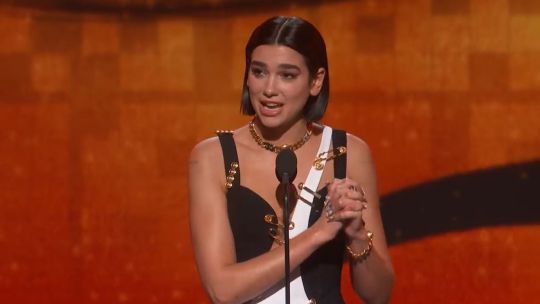
#_uuid:e79874b5-3744-32f1-ba17-48dbeaaf7a2b#_author:Rachel Thompson#_category:yct:001000002#_lmsid:a0Vd000000DTrEpEAL#_revsp:news.mashable
0 notes
Text
I had two profound experiences today, extremely unrelated in context but both thought provoking after the fact. The first experience had to do with me getting my first library card in 18 years and how I was very anxious to go into the library for any reason other than to print something.
I will detail this experience in a different post but long story short, all of the embarrassment and shame I felt because of my learning disability melted away and I ended up spending nearly two hours just browsing books. I left feeling to included and happy, I actually cried tears of joy.
Fast forward to the second notable experience of my day. Tonight I went on a date with my flat mate to “Naked Girls Reading: The Feminist Propaganda Edition”. Naked Girls Reading is apparently a sort of “brand”, started in the US as a protest against the ways women’s bodies are usually sexualized when naked. The theory is exactly what it sounds like, performers are completely nude and read aloud to the audience.
I had never heard of this amazing concept, so I jumped at the invitation. ESPECIALLY since tonight’s theme was feminism. I figured naked women reading feminist works sounded AUHMAZING.
[Rest behind a cut for length and transphobia]
The event was hosted by a popular personality in the New Zealand LGBTQPIA scene. They are a self labeled transvestite that MC’s events as their drag king persona, Hugo Grrrl. I assumed, if it was hosted by a gender diverse person it was going to be fairly inclusive.
Welp, you know what they say about assuming.
Things started promising as Hugo opened their monologue with my favorite greeting “Guys, gals and nonbinary pals”. Hugo then went on to talk about some of the topics of the night including body positivity, body hair, porn, sex work, sex positivity, etc. It sounded really exciting and inter-sectional, I was pumped.
Within the ten minute monologue there was also the disclaimer that “Although this is called “Naked Girls Reading”, gender is a spectrum and the binary is bullshit.” (woo, yeah!!) ”...We only call it that because it was started in America and we didn’t come up with the name.” (Wait, what?)
Ok... but you could literally just call it “Naked People Reading” or “Naked Folx Reading” or ANYTHING else if you want to TRULY be inclusionary. I wasn’t even concerned about the title UNTIL Hugo made the point to say gender binary is bullshit... but then to say “meh, we didn’t come up with the title we’re just being complacent in it” Was sort of shitty.
If you are trying to include people, then INCLUDE them. Don’t say “Hey I’m not transphobic, BUT....” There was no point of this disclaimer other than to point out you recognized a problem but would rather go along with it than change one word of the title of the show.
Things only went down hill from there. A few minutes later as Hugo was wrapping up the monologue they wanted to get the crowd pumped before introducing the performers for the evening. To do this, Hugo had “all the women cheer!” (which they did) then followed by “now all the men!” (which they did). It turned out it was just a set up to make the men a punchline of a very stereotypical “feminist hate men” joke. These jokes are always obnoxious and yes, I recognize Hugo was trying to connect to the large feminist audience so we could all laugh at how society views us...but again, we were back at only acknowledging the gender binary.
Now I realize many people right now will think I’m being extremely cynical. “Kit, you can’t say someone is being trans exclusionary if they are a queer that self identifies as a transvestite!” But I can because they were.
If you are going to mention nonbinary people. If you are going to make a point of talking about how the binary is bullshit. If you want to have a disclaimer that gender is a spectrum. It’s ALL or nothing.
Inclusion isn’t “I acknowledged you, you should be happy” it’s “I acknowledged you AND included you with everyone else as if we’re all the same.
The monologue is over, I am properly uncomfortable and agitated, the performers come out. From the promises of topics, I expected diversity. Again, that nasty assuming sure got the better of me.
Instead I get two skinny women and one average sized woman. They all appear to be white (although one was painted head to toe in blue and pink body paint as a My Little Pony...and later I learned she isn’t actually white.) They’re naked. So I can tell body hair isn’t really happening. A bit of bush but perfectly smooth everywhere else. All have shoulder length or longer hair and present very feminine.
Idk, again, maybe I was just so cynical by this point that I let my critic get away with me. I just wonder how hard it would be to find a more diverse cast? Am I just too deep in tumblr culture to expect to see different size bodies at a feminist reading? Or people with actual body hair, especially since there was a point of mentioning it in the monologue? Tattoos? Scars? Short hair? Disabilities? More racial diversity? (Again, the one woc was painted blue. And I feel shitty for thinking she was white but they could have included dark skinned people too.)
Introductions are done. The de-robing has happened. We now have three naked women sitting on a couch. Let’s read “feminist propaganda”!
Some pretty typical stuff, Maya Angelou, Gloria Steinem, big names of the feminist movement. There was a reading of an MRA’s post from some MRA website. (Why are we giving MRA’s an audience at a FEMINIST reading?!)
Intermission.
During intermission, I got up the courage to go speak to Hugo and mention why I was peeved at the start of the show with the women/men division of the audience. They shrugged and said “well it was a set up to a punch line” I smiled and replied, “I realize that but don’t you think trans folks are the punch line enough?” They tried to back track but it got awkward and I walked away.
Hugo does some “feminist” trivia during the break. Throwing prize bags of tampons and chocolate to whoever shouts the correct answer.
One question asks what does “SWERF” stand for. A woman yells the answer and Hugo repeats it back to the audience and says “Sex work exclusionary feminism isn’t feminism. Sex work is real work!”
It would have been so easy to also educate about TERFs. They don’t. The irony is not lost on me.
More trivia. I win one. I’m told, “Here enjoy these tampons!” I catch it and yell back, “Not all women have vaginas” I turn to the women at our table and say, “Hello, I don’t need tampons and I hate chocolate. Enjoy” They gladly accept.
Back to the readings...
A dramatic reading of Spice Girl lyrics. Some very heteronormative erotica. A reading of a radfem manifesto of the 70s (that included very acephobic commentary) And then, the woman painted as a MLP says she’s going to read Ivan E Coyote.
Now, for those of you who haven’t been blessed with reading their works or seeing Ivan perform (I just saw them again last week!), they are a trans writer from Canada. Very well known in LGBTQPIA circles. AMAZINGLY pure and moving stories and poems and “literary Doritos”. They are an amazing human being and have quickly become one of my favorite queer authors.
SO I AM STOKED!! This night has been so cishet heavy and I’m crank, I am READY to end it with Ivan. Ivan has written four of five books, has mountains of published poetry and she chooses to read a piece that is so personal to me.
She prefaces this with a quick word about Ivan being an LGBTQ author. But fails to mention they’re a trans masculine person who identifies as a Tom Boy.
The piece starts out as a love letter to femmes who are often erased from Queer culture because they are “assumed” to be straight. But then turns to Ivan’s journey through figuring out they were trans and how they became jealous of femmes sometimes and how they will never be seen as who they are. How they will always be coming out of the closet over and over and over. Because their identity isn’t “visibly recognized” because it’s outside the binary.
I sob every time I hear this poem because it is so personal to me. The first time I heard it was when Ivan performed in Chch last August. I was in the midst of struggling with how the world saw me and this poem touched a part of me I thought no one would <i>ever</i> understand.
I sobbed again tonight. My flat mate patted my hand. She sobbed too for the same reasons. The journey to figuring out your identity can be so isolating, terrifying and lonely. But when you hear your story being told by someone who is on a stage, with an audience, talking as if your journey was the most normal and natural experience....it’s an emotional time.
After she finished, the performer stated “As a cis woman, I obviously do not identity with the narrator. I do however think this poem speaks to me as a femme. Because we are often overlooked.” (This gets cheers from the audience)
I feel sick inside. This cis woman just spoke the very personal words of a trans person bearing their soul and claimed it as a poem for her.
No. You don’t get to do that. You don’t get to bend it to your whim. If you want to include poetry or stories about the trans experience, YOU FUCKING INCLUDE TRANS PERFORMERS.
Thank god the night was over.
My flat mate and I are sitting at our table deciding how to make our own event called “Naked Queers Reading” and how much better it would be. We’re minding our own business when out of the corner of my eye I see a crowd around the stage area.
Of course. There’s a man who has taken off his shirt to pose with the naked women so he can get his buddy to take his picture. Of fucking course there is.
That’s when we left.
I don’t know if I am just lucky to live in such a comfortable Queer circle of friends that I’ve become blind to the world of heternormative, patriarchal bullshit or if I am truly too fucking cynical to go out in public...but fuck was I disappointed with tonight.
Anyway, if you made it through this entire post, thank you. I promise I’ll post a really lovely story about the library tomorrow.
Right now I want to watch Ivan E Coyote performances on YouTube and drink my tea from my Unicorn Elixer mug.
11 notes
·
View notes